FOLLOW THE TRACK

SEPTEMBER 2024 years

























SEPTEMBER 2024 years























This celebration is dedicated to our dear friend Mary Samasoni, who sadly passed away in April 2024.
To see Māori and Pasifika thrive in all aspects of life, especially in the construction and infrastructure industry was Mary’s dream. The youth and training programmes we’ve delivered are her legacy.
For almost four years, Mary was an instrumental part of Link Alliance’s programmes that contribute to youth and social outcomes.
She created Scaffolding Through Sisterhood, streamlined school visits and was a key figure in providing training and upskilling opportunities for the team.
Mary’s ability to build strong relationships and her tenacity have changed the lives of many.
Ua fai atu le matai, Mālō Lava! O oe o le ‘au’auna lelei ma le fa’amaoni.
‘Ua e fa’amaoni i le tausiga o nei mea itiiti, o lea ‘ou te tofia ai oe e pule i mea e tele. Ulufale mai ia e fiafia fa’atasi ma lou matai.
Well done, good and faithful servant; thou hast been faithful over a few things, I will make thee ruler over many things: enter thou into the joy of thy lord.
Matthew 25:23
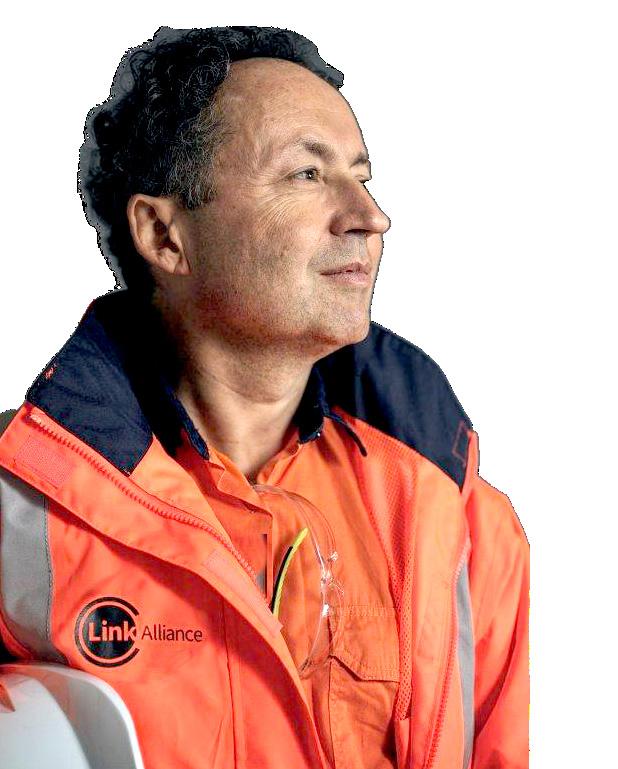
Kia ora, Talofa lava, Bonjour, Malo e lelei, Marhabal, Hello, Namaste, Ni hao, Nabad, Sahwasdee, Kia orana, Fakaalofa lahi atu, Annyeonghaseyo, Hola
When Link Alliance was established in mid-2019 to build the CRL’s main stations and tunnels, we were given a strong directive to build people up as we build the CRL.
We were asked to leave a legacy for Auckland with upskilled people and more opportunities for Māori, Pasifika, young people and women to grow and thrive in their careers and lives. We were also asked to give rangatahi a taste of what Science, Technology, Engineering, Art and Math (STEAM) related pathways might look like.
We took this challenge seriously and are incredibly proud to be celebrating five years of delivering for rangatahi by creating engagement, transformation and learning opportunities both big and small.
Months-long internships like the Progressive Employment Programme for youth not in employment or education, and summer internships for university students have enabled in-depth learning and career-starting opportunities.
Offering a work-experience week through Scaffolding Through Sisterhood (for wāhine), First Foundation and Te Ana Tūroa, have given high school students a taste of what a career in our industry might look like.
Hundreds of high school students have visited CRL sites, and the team has engaged thousands more through outreach programmes and online resources.
Although the CRL has generated a huge amount of technical innovation and engineering feats, people really are at the heart of what we’re doing. A key part of rangatahi programmes’ successes has been sharing authentic voices and journeys of our amazing team to help others to see themselves taking the same path.
With the project winding up, and the more technical testing and commissioning phases underway, our schools engagement programmes have come to a close.
Link Alliance set a high bar for other infrastructure projects by building people as we build the project, and we offer our learnings to other infrastructure projects on what is possible to enable young people to learn, try out work-experience, hear from role models and see opportunities for their future careers.
My sincerest thank you to the rangatahi, schools, education providers, community groups, industry and more for partnering with us. A huge thank you also to our team for driving the success of these programmes.
Ngā manaakitanga.
Francois Dudouit PROJECT DIRECTOR LINK ALLIANCE
300+ 66 1.5k 16 43 6
Rangatahi visited site through the Link Alliance Education Engagement Programme (LEEP)
Summer interns from universities across Aotearoa
Rangatahi engaged at outreach events
Progressive Employment Programme (PEP) Intern graduates
Māori immersion and First Foundation workexperience week learners
High school wāhine took part in Scaffolding Through Sisterhood (STS)
Want to know more? Check out the students and teachers online resources on our website

Being built to last 100-years, CRL will double Tāmaki Makaurau Auckland’s rail capacity.
The project includes twin 3.45km rail tunnels up to 42m below Auckland’s city centre, which connect redeveloped Waitematā (Britomart) and Maungawhau Stations. Two new underground stations are also being constructed – Karanga-a-Hape and Te Waihorotiu.
The CRL is Aotearoa New Zealand’s largest ever transport infrastructure project.
As the “link” name states, CRL links to Auckland’s existing rail lines. It will connect with the Western Line at redeveloped Maungawhau Station, and at Waitematā Station (Britomart) it’ll link up with train lines from the southern, eastern and western lines.
These new connections mean that Waitematā Station (Britomart) is no longer a dead end. This opens up the entire rail network, enabling twice as many trains to operate.
As well as transforming how we get around the city, the project is also improving streetscapes around stations and enabling construction of new shared spaces, homes, offices, and retail.

With a $5.5 billion investment, CRL is Aotearoa New Zealand’s largest ever transport infrastructure project.
Link Alliance is building the majority of the CRL –including the main station and tunnels, as well as installing, testing and commissioning rail infrastructure.
Link Alliance was set up as a construction alliance by client organisation City Rail Link Ltd together with, six additional designers and constructors from NZ and around the world. They agreed to work as one team to enable more successful project outcomes for CRL, better collaboration, sharing risk and rewards, and being more efficient, innovative and flexible.
Working as one team is a big part of Link Alliance’s culture. This is incredibly important because of the sheer size of what we’re trying to achieve and the complexity of the project. At peak construction, there was a crew of over 2,000 people building the CRL.
Link Alliance made a commitment to building people up with the project by investing in programmes for rangatahi.
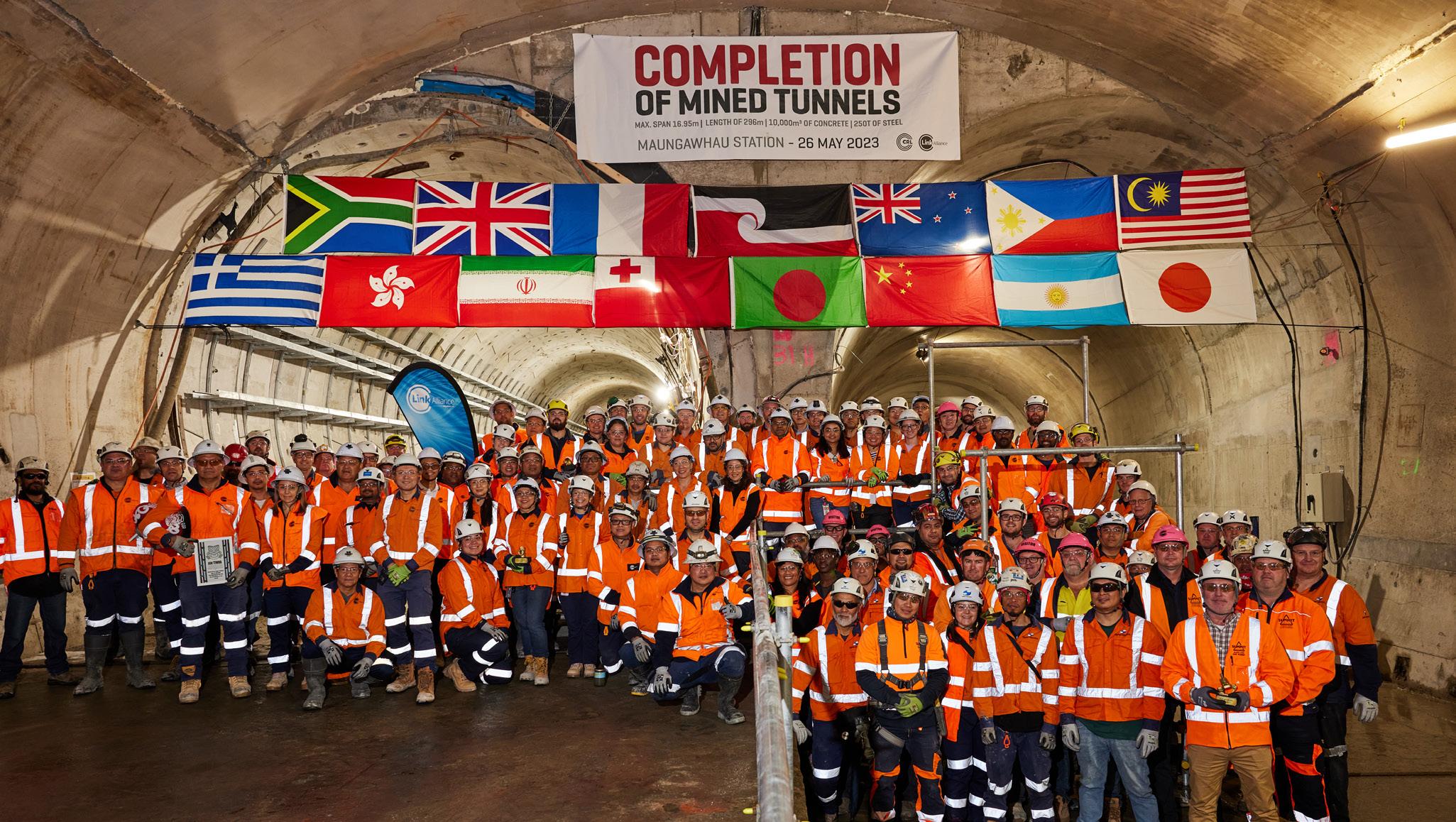
Breaking down barriers to join the workforce
PEP is a 16-week internship designed to help Māori and Pasifika rangatahi break through employment barriers to meaningful employment.
Over the past five years, Link Alliance has offered PEP internships to young people between the ages of 16-24 years old not already in employment. In total, 43 rangatahi have graduated.
Of the youth programmes we’ve delivered, PEP is the most resource intense and comprehensive. It was designed to provide wraparound support for interns and give them the best possible chance to succeed, including by:
` Having a dedicated programme coordinator
` Creating a structured placement that’s enriched with meaningful on-the-job learning opportunities, where interns can try out a variety of roles onsite and in the office
` Working closely with pastoral care organisations who support interns while they are part of PEP
` Providing interns formal training for work and life like budgeting, computer skills, leadership and organisation
` Paying interns the living wage
` Providing each intern their own Link Alliance mentor
` Grouping interns into cohorts of around four at a time, with intakes twice a year.
Once they graduate, interns can secure fulltime employment within Link Alliance if there’s a suitable role available.
We cannot understate the positive impact that the programme has had on rangatahi, their families and team members who have provided mentoring and manaki for these young people. PEP has generated a large amount of interest from others in the industry (both in New Zealand and overseas) and won multiple awards for its innovative approach to giving interns a leg up and holistic support.
joined PEP 47
Employed with Link Alliance for more than 12-months 14

The ‘Progressive’ in the name of the programme refers to rangatahi working hours, which progressively increase.
Interns work 8-10 hours for the first two weeks, then up to 14 hours for two weeks, then 21 hours, finally ending at around 30 hours per week. This is to ease them into a ‘normal’ working week once they finish the programme and expect to work 40+ hours.
A progressive approach also enables mentors and managers to see how the intern conducts themselves and interacts with the rest of the team. This helps them to consider if there were an opportunity to hire the intern into a permanent role after graduation.
An integral component of PEP is giving interns the opportunity to gain microcredentials. During their 16-week placement they learn the fundamentals of money management like budgeting, saving, investing, reading payslips, what PAYE is, KiwiSaver and tax.
They also complete confidence-building training and learn about digital literacy, including training on how to use the Microsoft Office suite and staying safe online.
Interns have told us how important these learning opportunities have been for their development and self-empowerment.
Link Alliance’s chosen training partner for rangatahi is Education Unlimited.
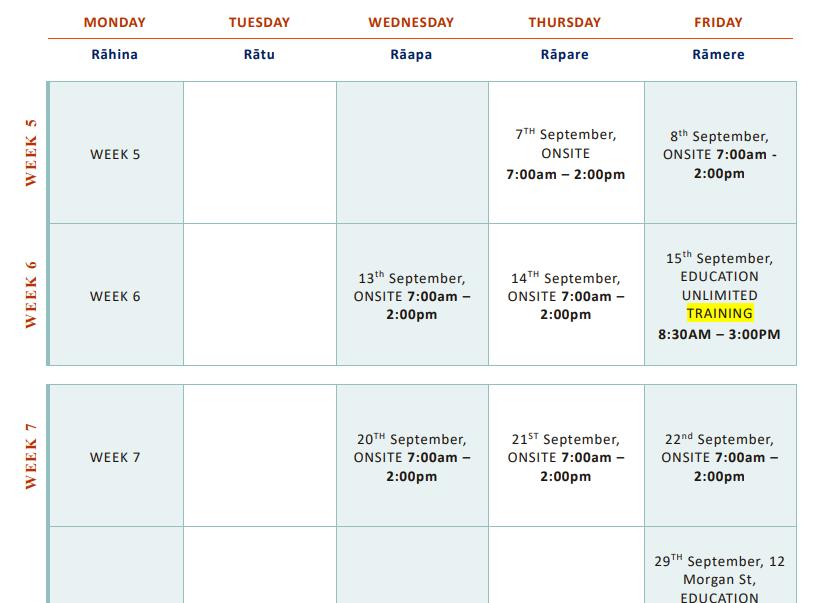
This is an example of a PEP timetable, showing a progression of working days and detailed information regarding each work week.
Regularly celebrating milestones is another important part of PEP delivery.
Interns are warmly and formally welcomed to the team by whakatau (a welcome ceremony similar to a pōwhiri) which is attended by their whānau (families) and by Link Alliance whānau. Whakatau acknowledges that interns are joining the Link Alliance’s whānau and that while they’re here, we’ll care for them and keep them safe. Micro-credential completion and the internship’s halfway point are also celebrated.
Graduation is a big deal, with ceremonies attended by as many as 70 people. During their ceremony, attendees share stories on how far they have come.
“I especially loved the Money Confidence training. Until now it has been really hard for me to save money because every time I get a paycheck I just spend it all. They taught us about the importance of having a goal now I’m saving for a car!” - 2024 INTERN
Once approval to offer PEP was given by CRL Ltd’s Board, we sought funding, advice and support from the Ministry of Social Development (MSD).
Since 2019, CRL Ltd has requested and received funding from MSD to support PEP. MSD has been very clear that funding is not guaranteed from one year to the next. Funding was formalised through an Outcome Agreement between MSD and CRL Ltd, with outcomes being delivered by Link Alliance.
MSD’s purpose is to help New Zealanders to be safe, strong and independent, and PEP contributes to this purpose, including by:
` providing effective support
` creating equity of outcomes particularly for Māori
` contributing to industry and regional development
` creating effective connections across different providers
` delivering employment outcomes through sustainable work
` improving on people’s readiness for work, including through training and education.
A main point of difference in PEP’s delivery is the way we’ve partnered with pastoral care providers to ensure interns have wrap-around support if needed. We strongly believe that interns’ achievements would not have been possible without them.
Over the years, pastoral care providers have supported interns on critical issues like housing assistance, transportation costs, mediation and providing financial assistance.
Thank you
Te Ara Rangatahi Charitable Trust (Mana Whenua)
LifeWise
Whai Māia Ngati Whātua ki Ōrakei (Mana Whenua)
The Rising Foundation
Te Whānau o Waipāreira (Māori)
Youth Horizons
Mā Te Huruhuru (Māori)
ITA (Industry Training Auckland)
AMA Training (Māori)
QES (Pacific)
Solomon Group (Pacific)
MSD City Jobs and Skills Hubs (Central/Northern)
Education Unlimited (EU)
Impact
With PEP now drawn to a close, we can look back proudly on our efforts. 43 rangatahi have graduated. Of these, 26 went into employment with Link Alliance, with 14 employed for more than 12-months.
Formal training has provided interns with skills in areas like managing finances, digital proficiency and building confidence. Interns tell us that training has helped them gain relevant work-ready skills.
A main point of difference in how we’ve delivered PEP is the inclusion of pastoral care providers for interns so they have support available if needed.
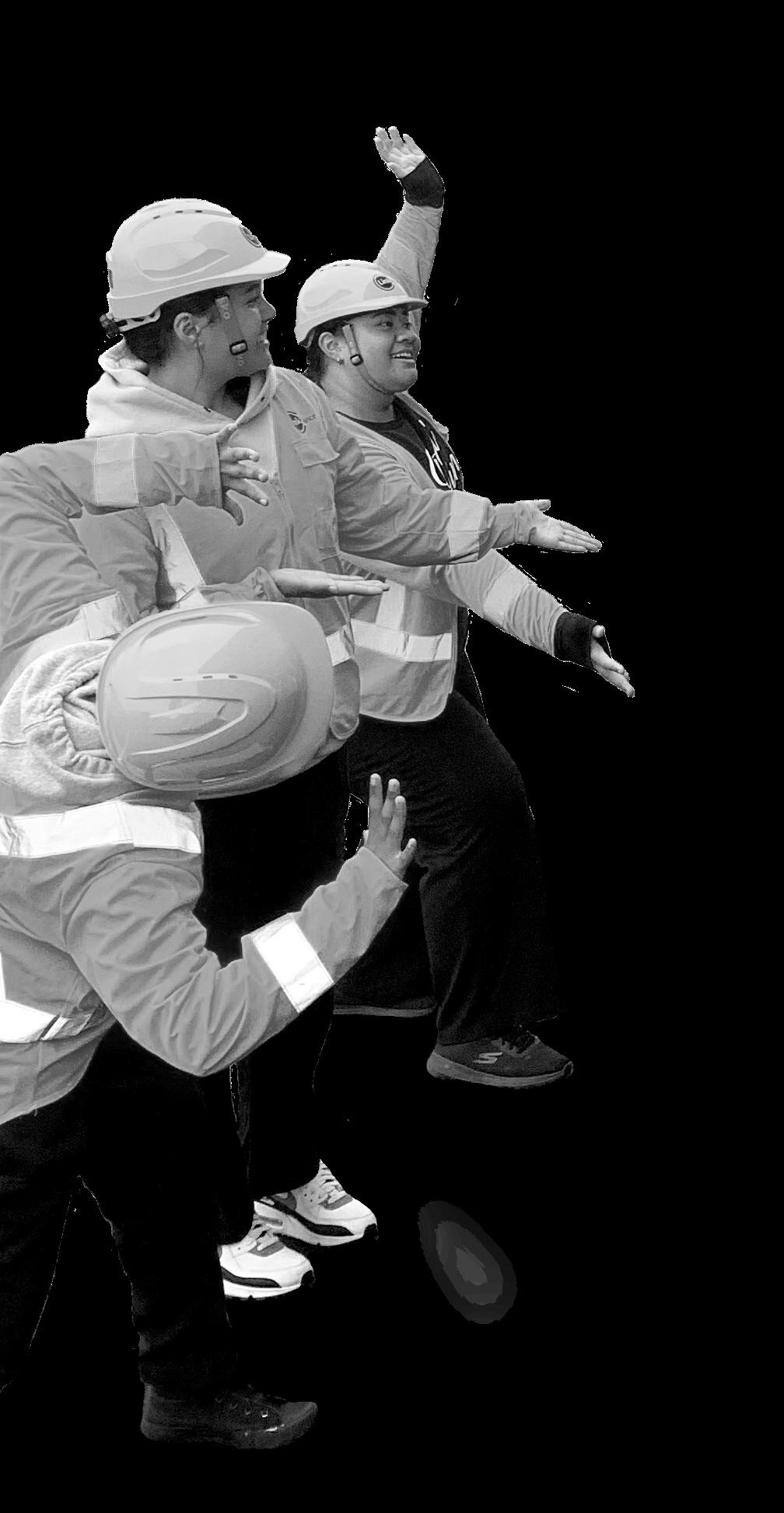
Interns also tell us that their time with Link Alliance has helped build their confidence, feel valued and helped them understand what they want next in their careers. We have found that PEP has significantly improved interns’ chances of gaining quality employment in the construction, infrastructure and rail industries now and in the future. Several rangatahi are still with Link Alliance in roles like IT, environmental assistance, risk assessment, health and safety and engineering. Others left to complete painting and plastering apprenticeships, traffic control, or electrical apprenticeships. Some have gone on to tertiary study.
PEP hasn’t just benefitted the interns. Their experiences also positively impacted families and networks including by creating hope and pride for these young people – most of whom are in their first paid job.
PEP has also been good for our team. Having interns on site creates positive leadership and mentoring opportunities for those who invest in the interns’ wellbeing, safety and learning. Our people go out of their way to keep interns safe and provide manaaki (care).
Brandi Harrison’s story is a perfect example of coming full circle. While she was a PEP intern in 2020, she was supported by Te Whānau o Waipāreira. After graduating from her internship, she tried a few different roles in Link Alliance, including Human Resources. Following this, Brandi joined Education Unlimited.
In 2023 Brandi started as a Youth Support Worker with Te Whānau o Waipāreira and supported a PEP participant into the programme at the end of 2023.
“Learning how to network expanded my world and understand other kinds of work I want to do.”



The best things about PEP were meeting new people and learning new things on the project. I chose to work in IT, and have been with CRL for five years now. I would encourage others to take the opportunity and hold on to it because you never know where it will take you, or the people you could meet that could change your life.
I gained a lot of confidence throughout PEP – in fact my mum was quite shocked by the transformation and says she has seen such a difference in me. I was so socially awkward when I started this course, but my mentor helped me learn to talk to people more easily and open up more, and I learned skills that helped with making presentations and public speaking.


I’m now working full-time at the Karanga-a-Hape Station site as an Environmental Assistant, and I’m studying Environmental Science at the University of Auckland, doing two papers a semester. When I started on the CRL project I never would have imagined it’d take me down this path. I have chosen a career in environment because it’s something that I enjoy but also find challenging, and I see a lot of room for change and improvement.
When I graduated PEP, I was lucky to be offered three roles with Link Alliance, and I ultimately chose to work with the risk team where I’ve been since. PEP really helped me to get out of my bubble, meet people and build up my confidence. I have learned so much about construction and it’s given me the courage to work on-site and in the office.
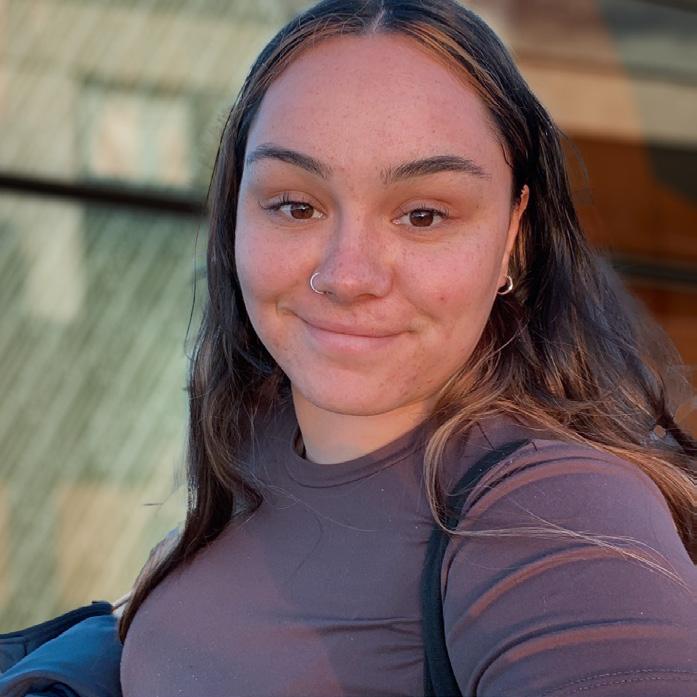
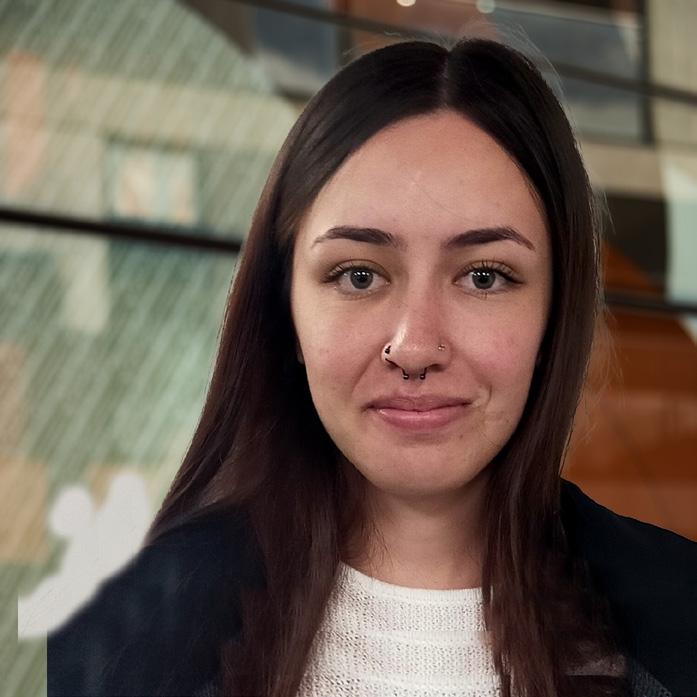
My journey had its ups and downs. It was definitely challenging at times, especially being in an industry filled with males and a lot of strong characters. This made me want to push through to succeed in my role. It’s helped me a lot because it made me realise that there’s more to learn and that I don’t need to be scared to speak up and ask for help.
To be honest, I wasn’t sure I would enjoy the internship! But I did. I like working on site and have made so many connections. I had always planned on being a dancer, but I’ve appreciated my time working as the site administrator for Te Waihorotiu Station, where I still am today.
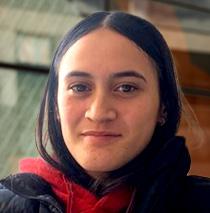

I’ve enjoyed making new friends, getting closer with the group. I’d previously worked with people only older than me so it was cool to get to know youth the same or nearly the same age as me.
I didn’t know what to expect but I wanted to learn in a different environment and thought I’d try something new. PEP gave me a bigger view of the construction industry, and I have chosen a career in Health & Safety. I was at CRL for five years, and have recently moved into a Heath & Safety Advisor role with Brian Perry Civil.
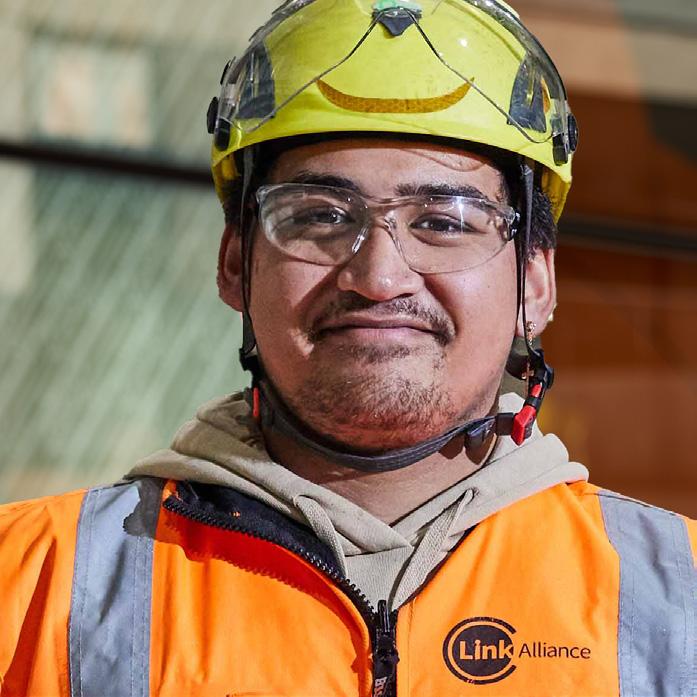
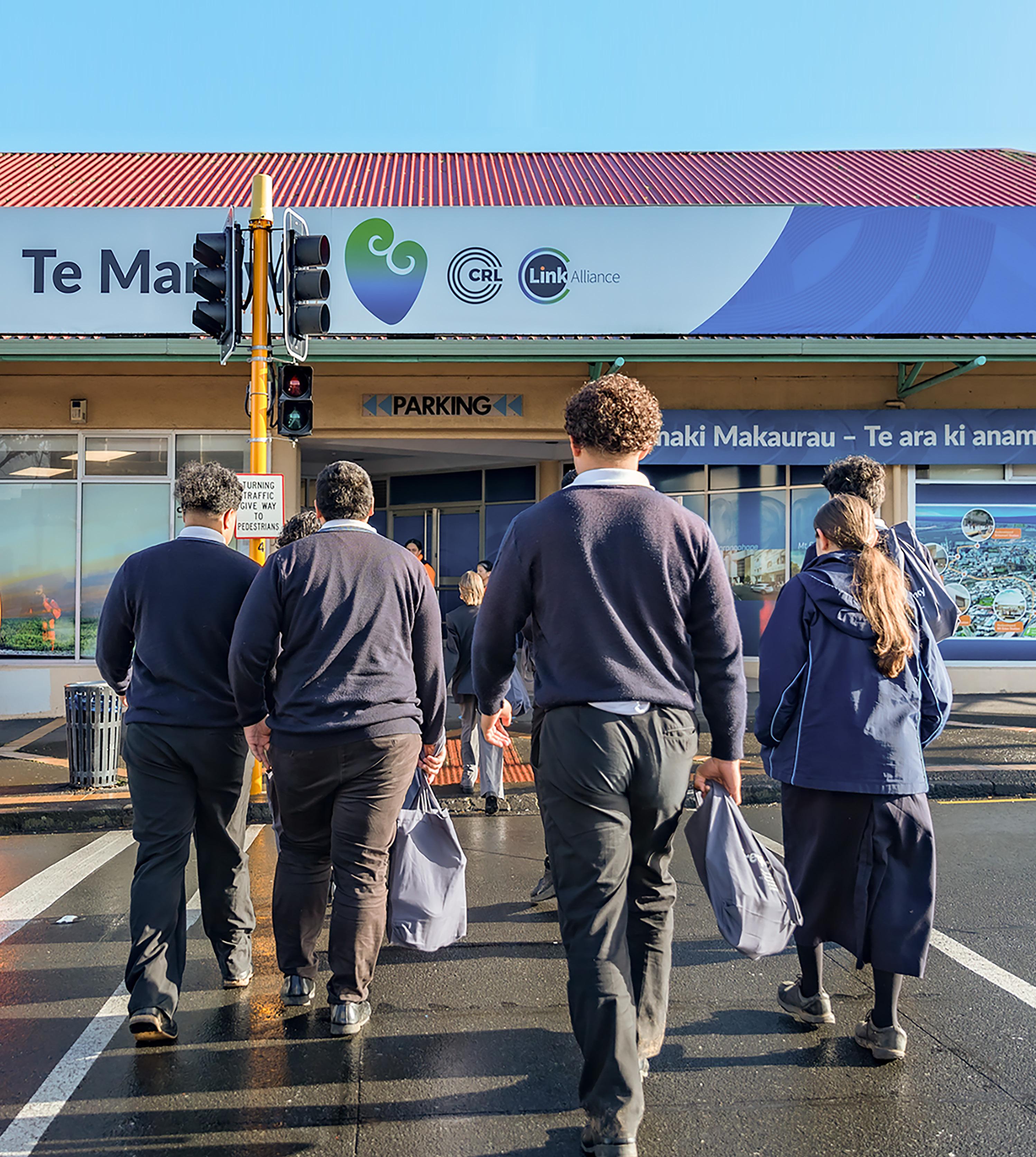
The construction and infrastructure industry isn’t visible or accessible for many communities so we developed LEEP to help bridge this.
Where PEP provides wrap-around support to rangatahi, LEEP was designed to give high schoolers aged 16-andover a first taste of infrastructure and construction by enabling them to visit site safely, hear about the project and our team’s journeys and careers.
School visits to the workplace are a tried and tested way to expose students to career options. We wanted to provide this opportunity on the CRL to help broaden rangatahi horizons, raise aspirations, challenge stereotypes and help them to become better informed about the types of jobs and career pathways available.
During a two-and-a-half-hour LEEP visit:
` team members share their career experiences –including how they got started and why they’ve chosen their career
` students get an overview about the project and some of the engineering feats achieved to deliver it
` students are kitted up into PPE and go on a guided tour of one of our station sites.
A lot of engagement and relationship building takes place before schools join a LEEP experience. Visits have been hugely popular every year since we started offering the programme. We’ve had to unfortunately turn away many schools because we haven’t had capacity to bring them all onsite.
Some of the ways that we have connected with schools include:
` meeting schools during outreach events
` through MSD Jobs & Skills Hub – particularly working with Community Facilitators who share LEEP opportunities with their schools networks
` word of mouth – educators who have brought rangatahi onto site will recommend it to others
` cold calls from social media and media channels.

Pre-site visit organisation considerations
` Have one key contact with a school representative to ensure they know what to expect and understand health and safety requirements.
` Only offer a visit to students that are 16-years or older
` Find out if there are any special interests from students that we can build on with regard to speakers, content and the tour route
` Ensure we have the right PPE sizes for students and teachers
On the day of a LEEP tour
Typically, this is what our tours look like:
` Students arrive at 9:30am (we set this time so our team knows what to expect, and we are there for the morning tea break, which reduces potential disruption)
` Two presentations are shared by our team
` H&S induction, stating requirements and behaviour expected
` PPE is checked to ensure it’s worn correctly
` Site visit at one of the stations
` Light refreshments at the end of the tour
` Students are asked to fill out a quick questionnaire on their thoughts of the programme and recommendations
Thank you for participating in a LEEP tour
Aorere College
Central Auckland Specialist School
Kelston Girls’ College
Massey High School
Pukekohe High School
King’s College
Northcote College
Auckland Girls’ Grammar
Glenfield College
Māngere College
Ōtāhuhu College
St Peter’s College
Waitakere College
Selwyn College
Auckland Grammar School
Kelston Boys’ High School
Manurewa High School
Papakura High School
TKKM Hoani Waititi Marae
Rosmini College
Sancta Maria College
Mt Albert Grammar School
Puatala
First Foundation
Orewa College
Westlake Boys High School
Tāmaki College
We have also welcomed teachers onto the project. In 2022, 30 teachers were welcomed as part of a week-long BLAKE Inspire for Teachers conference and shared how we are delivering on environmental and sustainability objectives.
Harvest was first introduced to CRL when she came on a LEEP tour with her school, Kelston Girls’ College, and now she brings other rangatahi onto the project.
Having school LEEP visits managed centrally is a big part of what makes them successful. Part of Harvest’s role is to liaise with schools, students and the team, ensuring that everyone stays safe and we give students the best possible experience.
Harvest is also integral in facilitating, organising and overseeing the success of the Scaffolding Through Sisterhood work experience programme, and helping to coordinate the Progressive Employment Programme.
A coordinated approach is essential to the programme’s success, by ensuring that schools, students, mentors and Link Alliance are all on the same page.
“My first time stepping onsite was breathtaking, we got to check out the different equipment and learn more about the TBM. I think LEEP tours are a good opportunity for high school students because they get a really good overview on the CRL project and get to hear from the team about their day-to-day role.
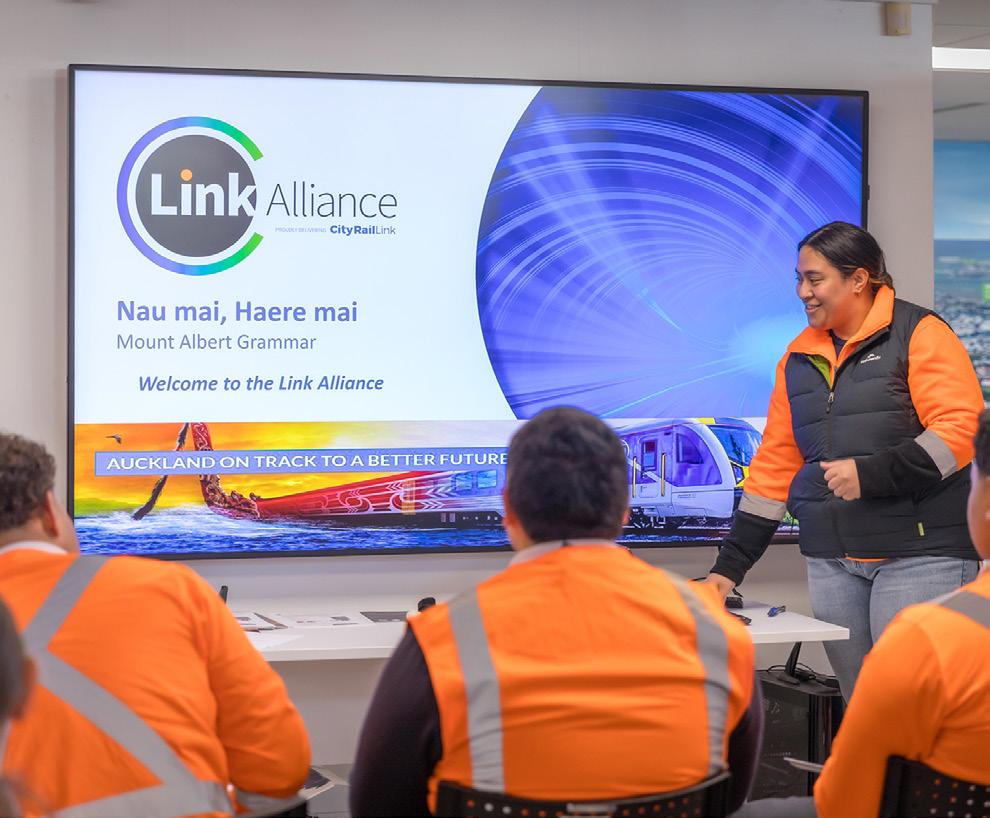
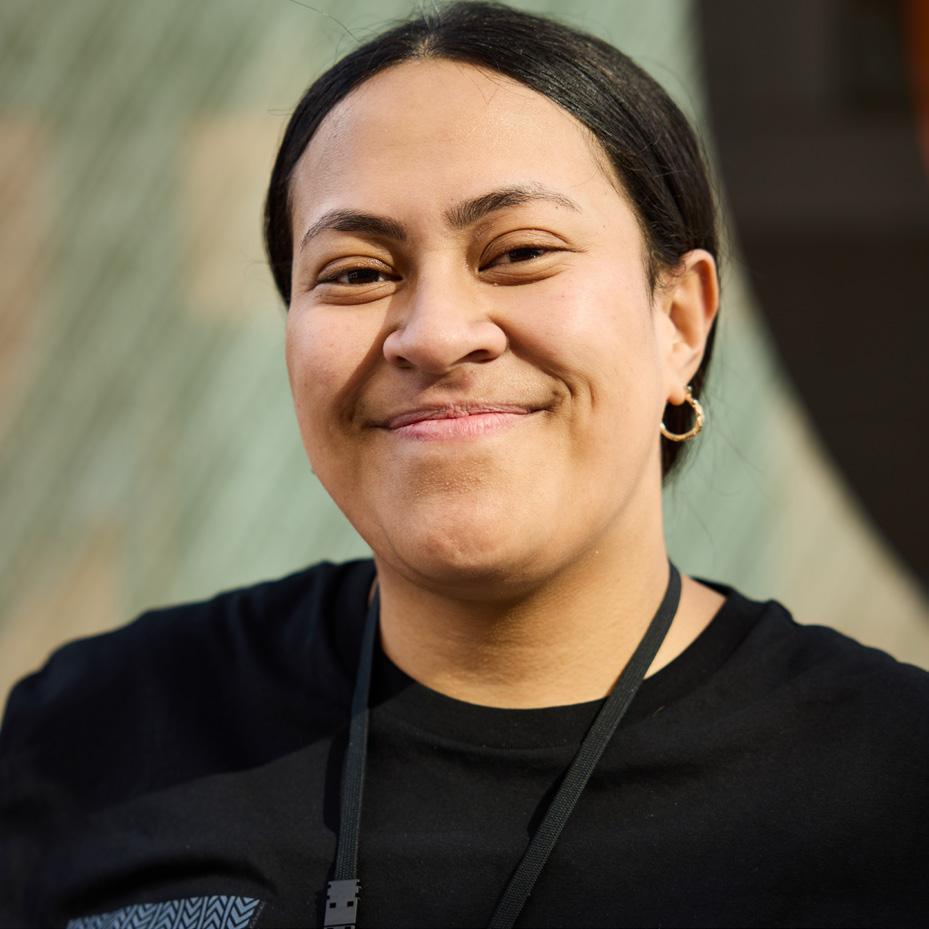
“My job is to offer students an opportunity to experience the project, give them advice and encourage them to always have an open mind about what they want to do in the future.”
“The presentation is a good start for when the students come along because they get to see what it looked like in the early days, and then when they visit site, everything has changed. The students also learn about different roles and what it’s actually like doing the work.”

We developed STS specifically for Māori and Pasifika wāhine in high school. It’s a week-long workexperience programme run during school holidays, where a young woman is paired with a mentor from Link Alliance. For a week (Monday-Friday), they’re given an in depth introduction to the project, visit site, complete tasks and meet as many people as possible.
The idea for STS came from discussions with female LEEP tour attendees who said they wanted to learn more about the industry before deciding on their next steps after leaving school.
How we deliver STS
` After receiving nominations, potential participants are interviewed online to discuss expectations, dig a bit deeper into specific career goals, and figure out whether they’ll be a good fit for the programme. Participants are also informed that they’ll need to pass a drug and alcohol test on their first day
` After interviews, four wāhine are selected in each STS cohort
` Once potential career goals are established (for example if they’re interested in engineering, communications, finance, HR etc) we match them with a mentor with relevant work experience
` On the first morning of the programme, wāhine, their families, mentors and some of the wider Link Alliance team take part in a whakatau, with kai shared afterwards
` During the week, wāhine shadow their mentor, complete tasks, go onsite, and have regular check ins
` A graduation marks the end of the programme where wāhine and mentors share their experiences and learnings over the week. Certificates are presented to each student, along with a small gift to signify this special occasion
` Food is shared once speeches close.
We worked hard to find wāhine who will get the most out of STS placements and use the experience to help them decide what they want to do next in their careers.
Some of the ways that have supported this outcome include:
` Building strong relationships with MSD and high schools to find wāhine
` Shoulder tapping wāhine who had already been on a LEEP tour who we could see were excited about the project
` After wāhine showed interest in joining STS, they completed an Expression of Interest document
` Wāhine were interviewed to discuss their areas of interest
` We then paired wāhine with someone who would be a good fit
` Family support was an integral part of ensuring wāhine had a successful STS experience.
Scaffolding Through Sisterhood has activated the aspirations of many young wāhine to work in the industry and for others it has made them reassess and reset.
“It opened my eyes to see there’s more I can do”
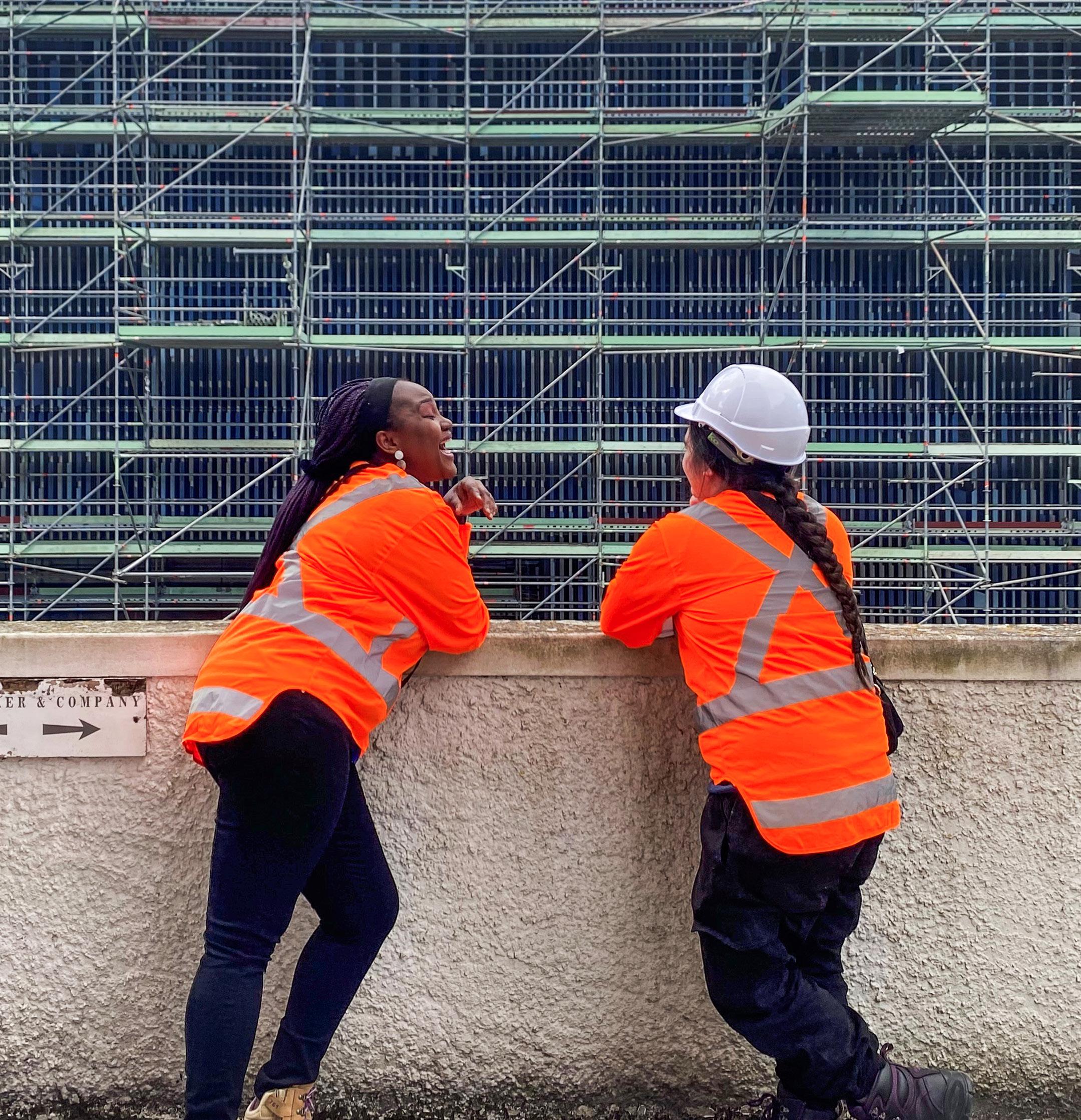
Meet Aleina Shepherd, who was a 17-year-old Waitakere College student when she joined STS. She enjoyed her work experience week so much that after she finished high school, she came back and completed a PEP internship. She’d initially heard about STS through her teacher and decided to join because she wanted to see what our industry was about. Because she wasn’t sure what area she was most interested in, we sent her on a series of speed dates across Link Alliance’s disciplines.
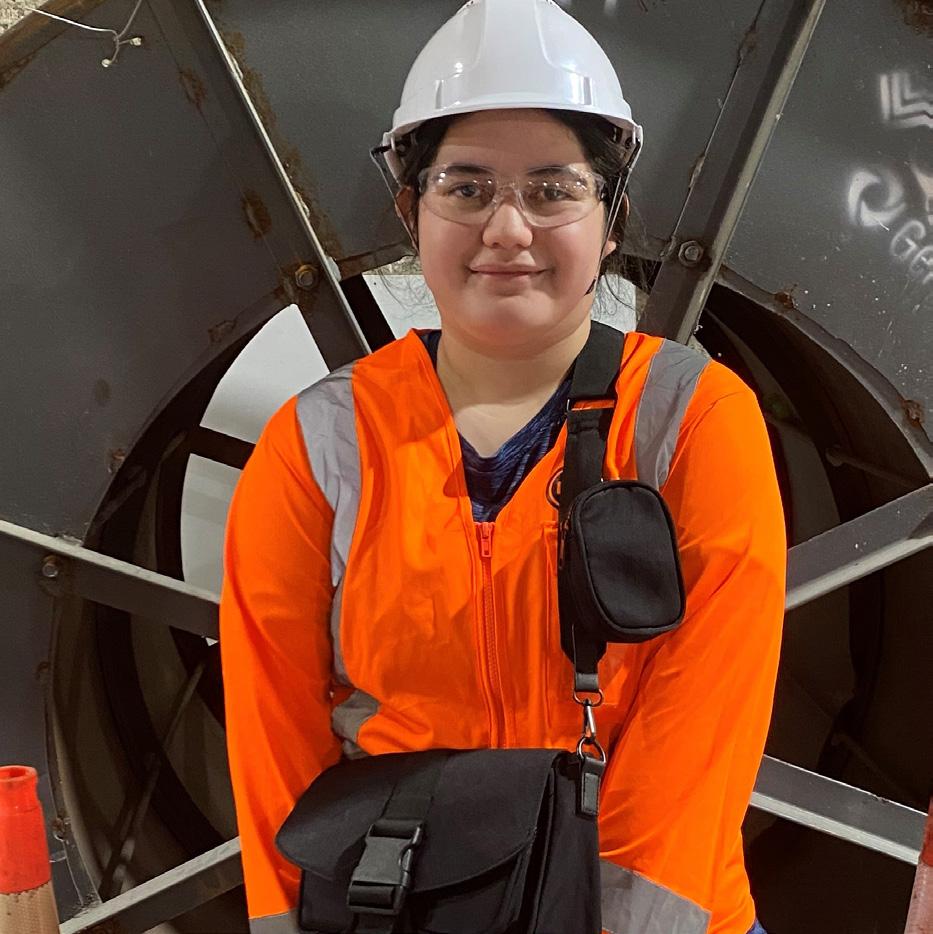
Building on the success of STS in supporting young wāhine, we extended work experience week opportunities to First Foundation and Te Kura Māori o Ngā Tapuwae in Mangere (a Māori immersion school) students.
These created new hands-on learning opportunities for more young people to complete a work-experience week, who might not otherwise have had the

First Foundation
First Foundation provides high school students from low-socioeconomic areas who are predominantly Māori and Pasifika with financial assistance, mentoring and other opportunities to study at university.
In 2024, we welcomed four students to join a week-long work-based learning programme. Students were in their first or second year of university and told us that it was a good way to see what the workplace might look like, once they graduate, and how they might want to build their career.
Each student was partnered with a mentor in their chosen field (or as close to it as possible).
Te Ana Tūroa
He huarahi kua hangaia hei whakatenatena I te taiohi Māori ki te ao Hanganga
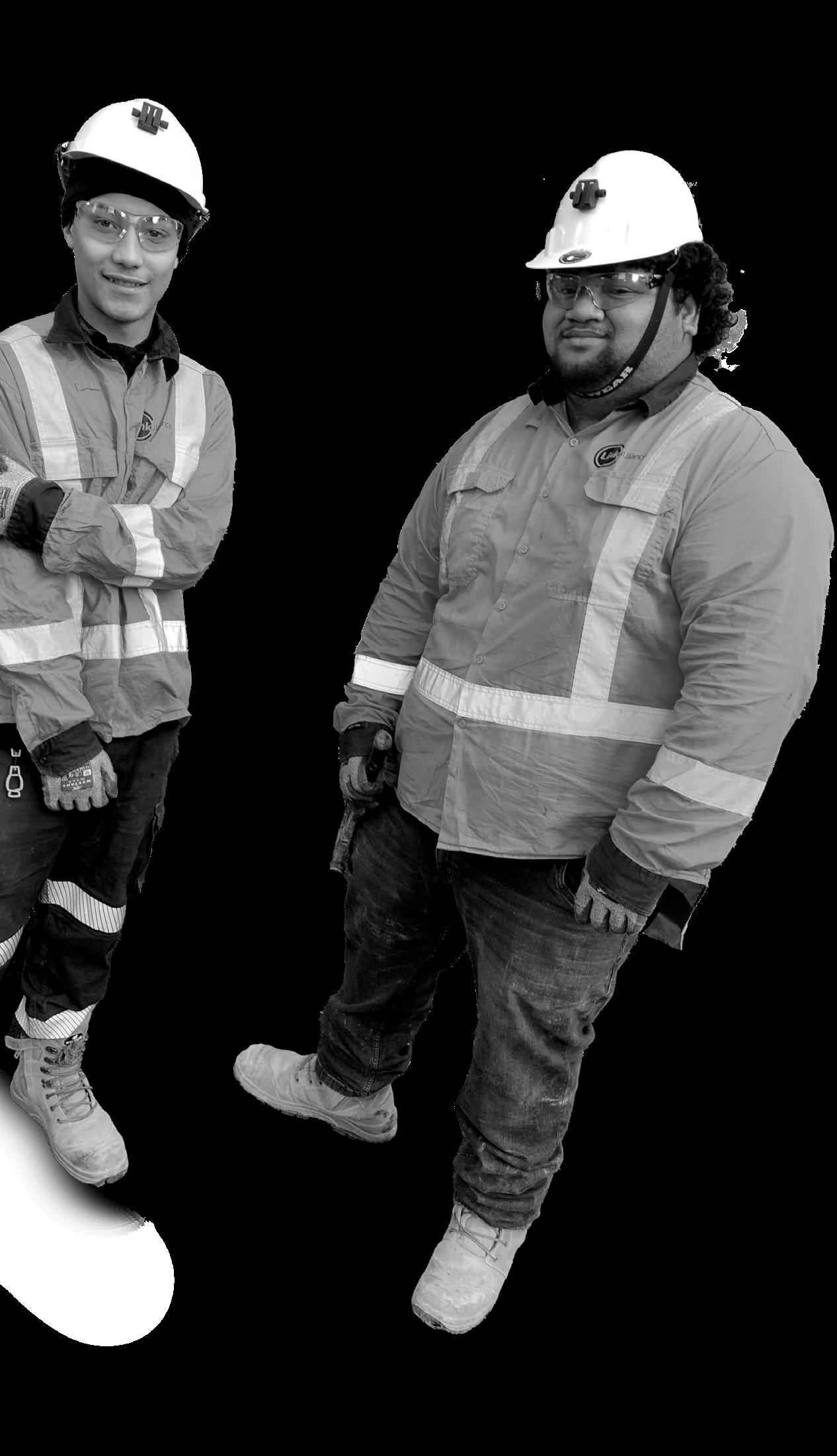
In 2024, we also welcomed a group of First Foundation students to tour our sites at Waitematā Station (Britomart) and visit the tunnels.
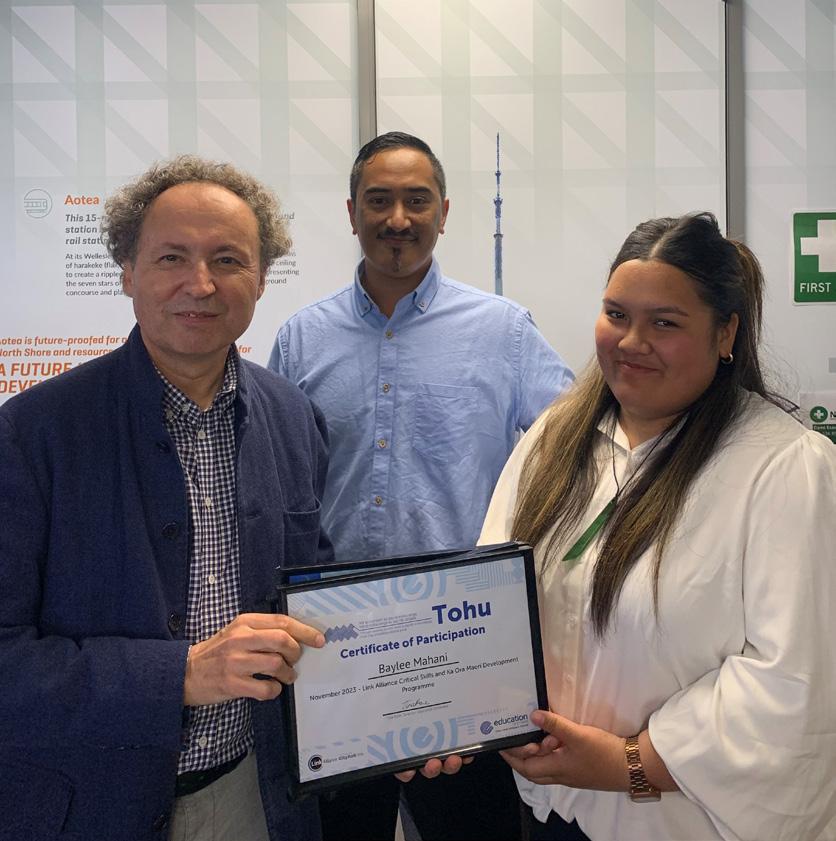
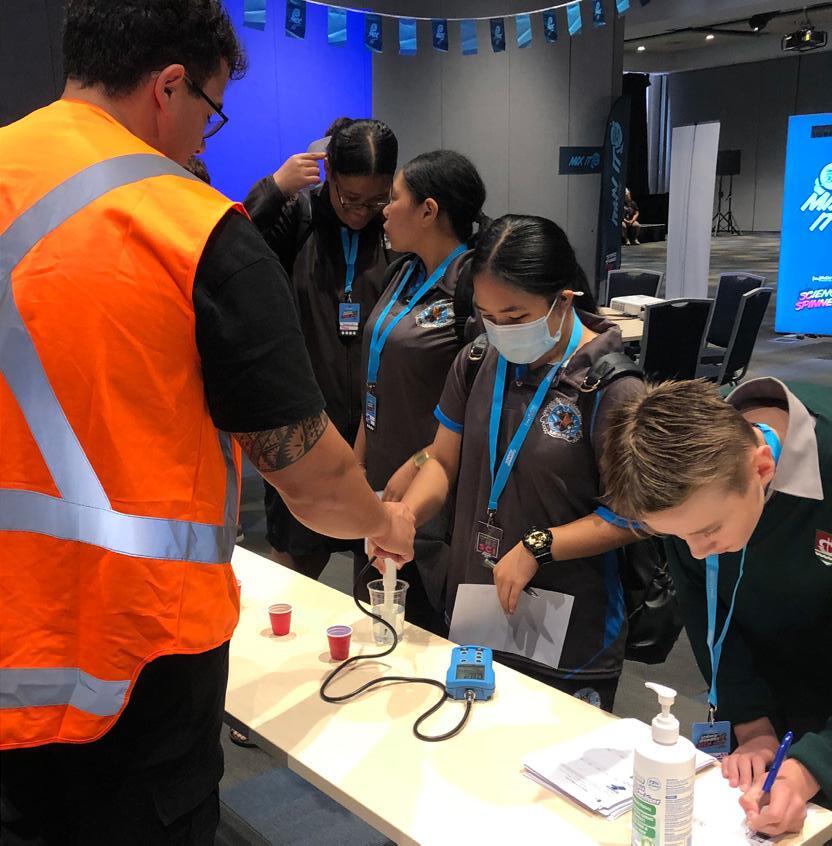

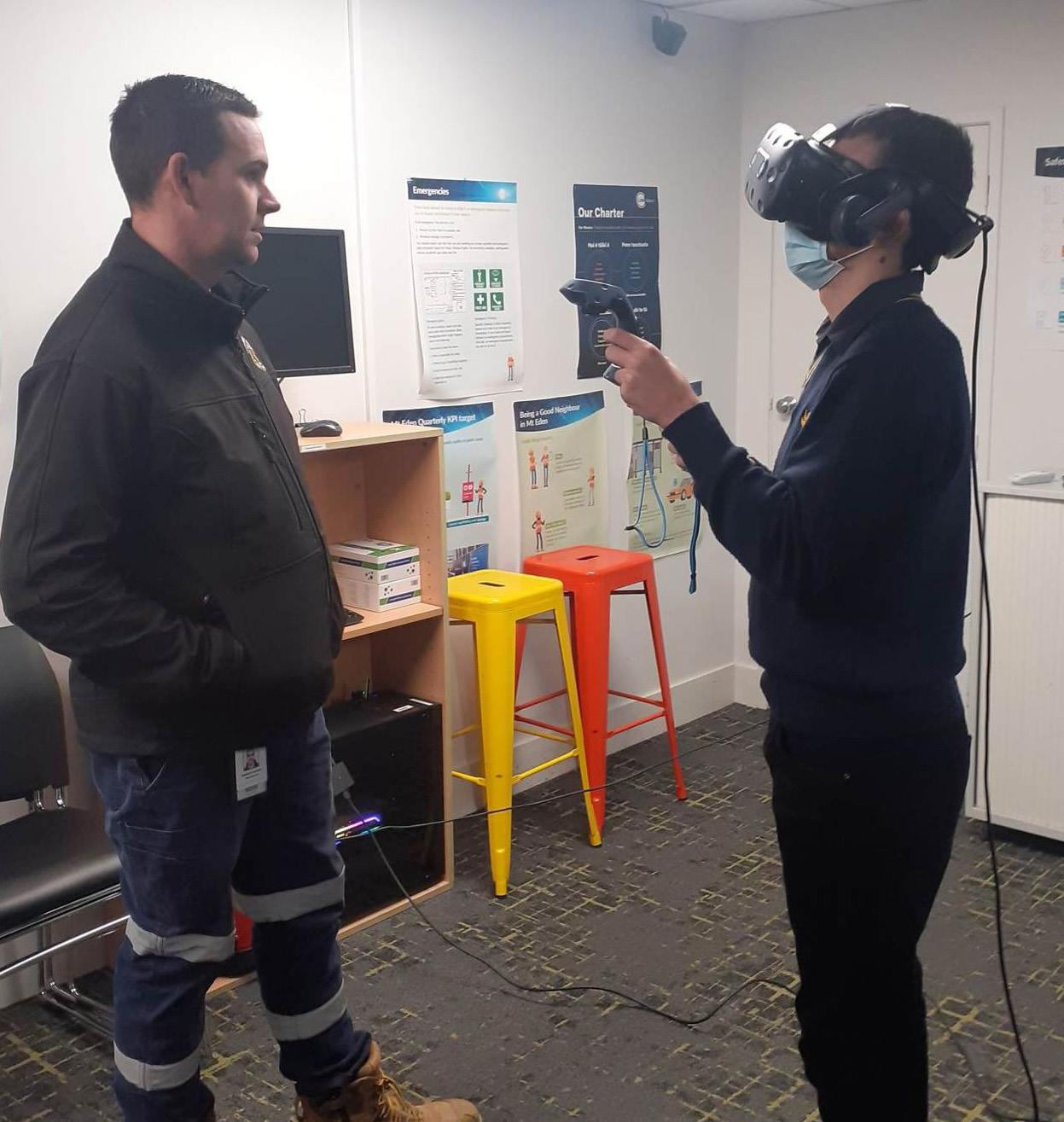

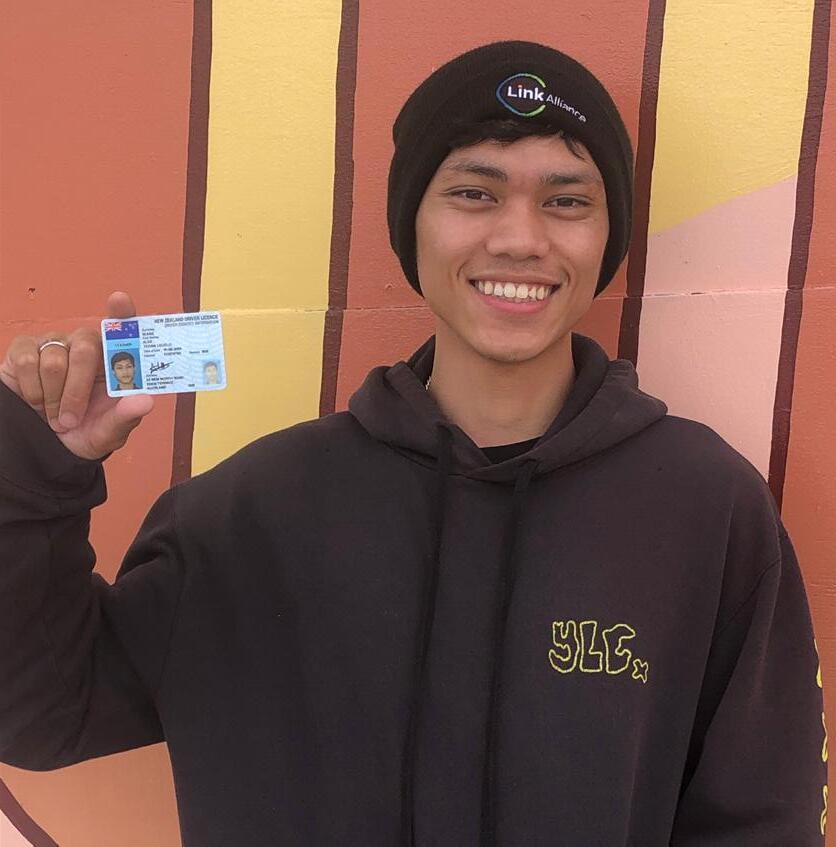
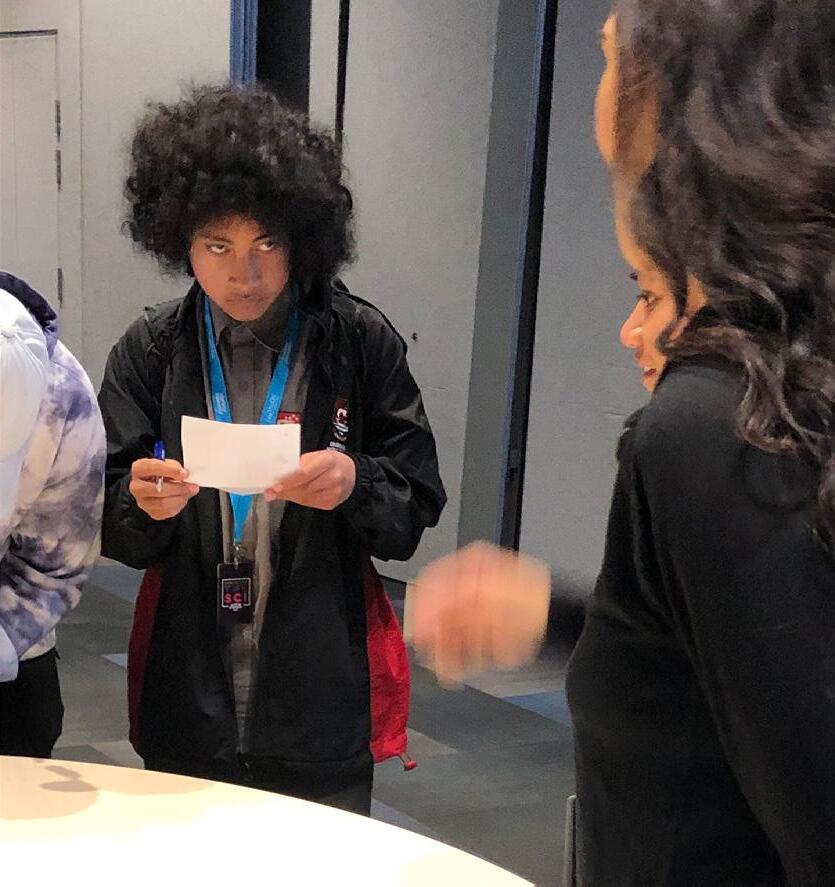
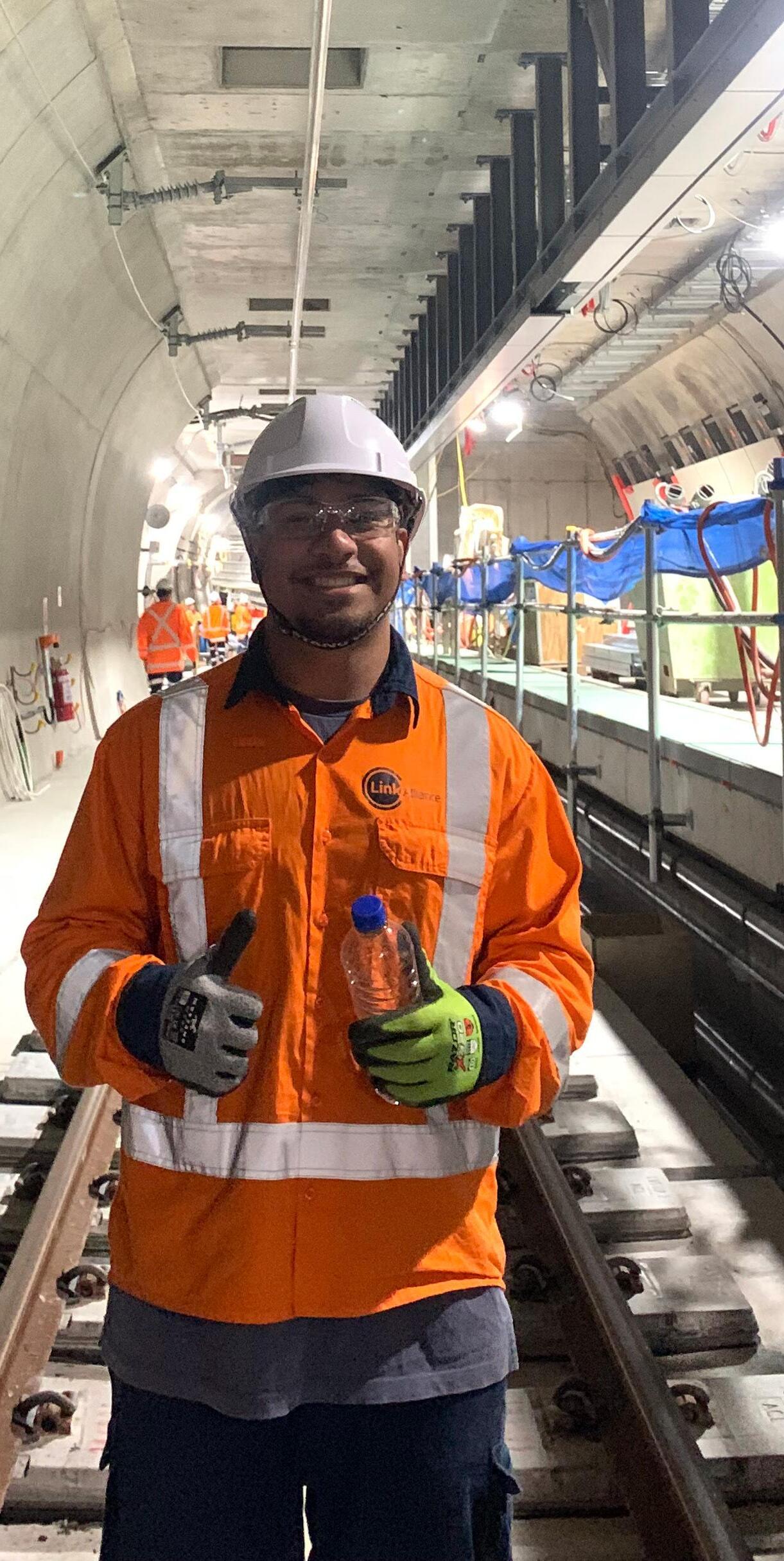

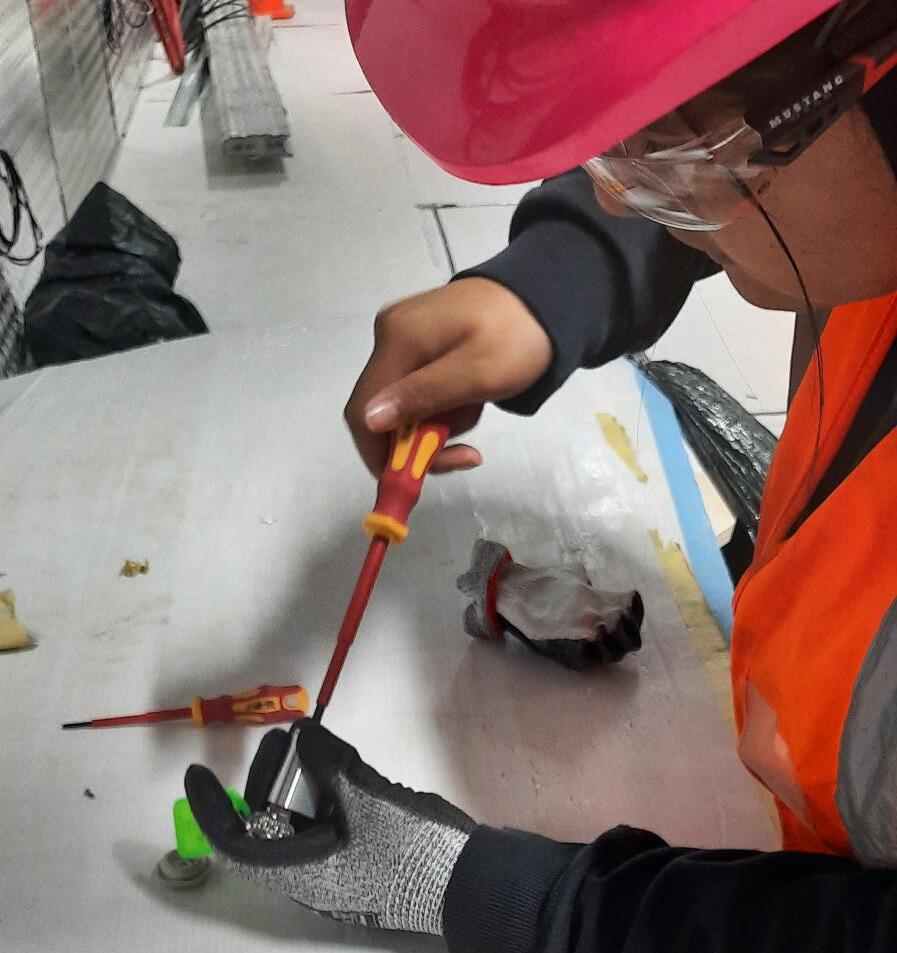
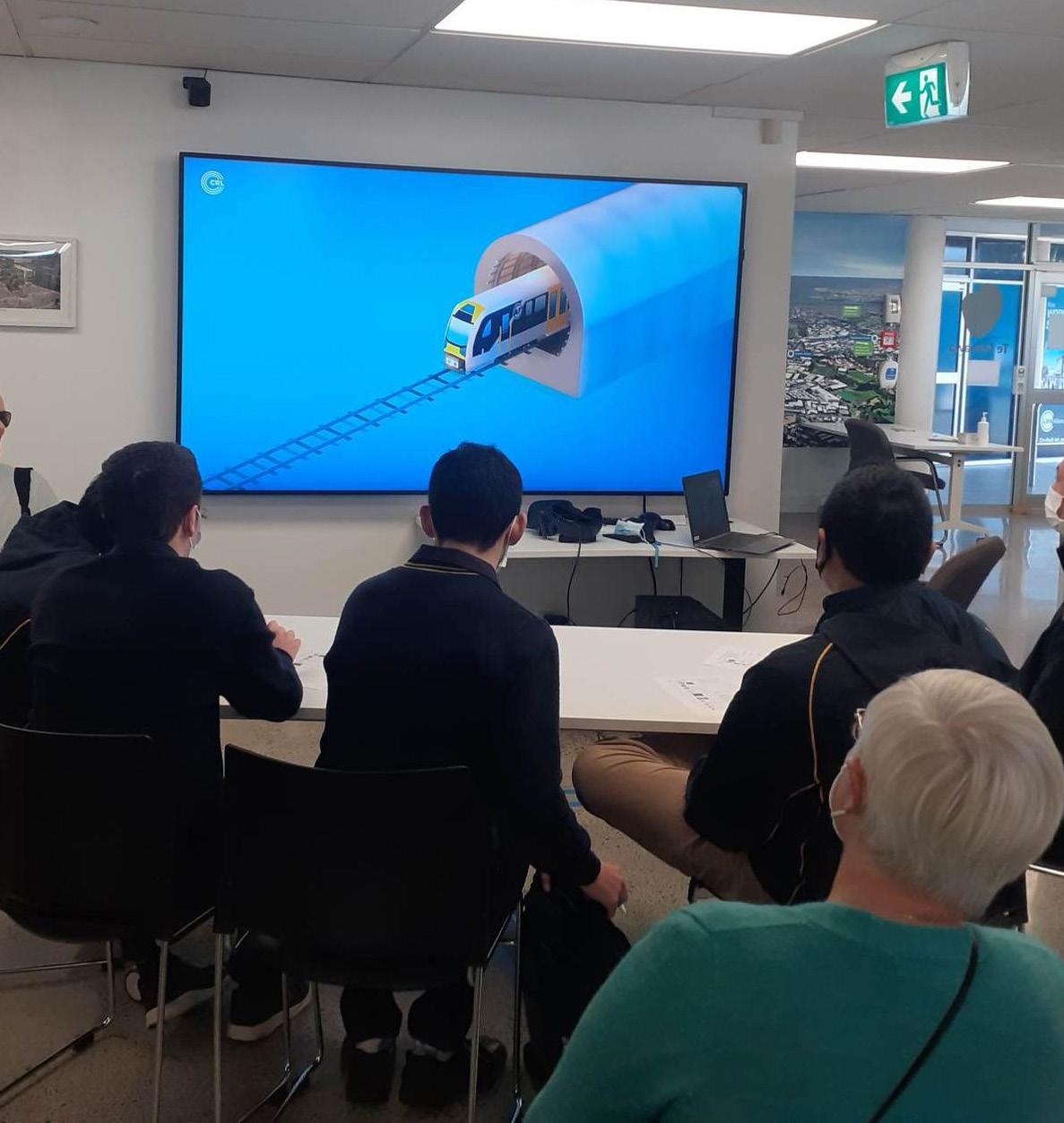
Since 2019, five cohorts of summer interns have been welcomed onto the project to complete a three-month structured workplace-based training and mentoring programme, designed to build confidence, experience and relationships.
Interns have largely been engineering students, however there have also been some from other disciplines like environmental science, planning and commerce. Students have come from across Aotearoa New Zealand, and a few have been employed after they completed their studies.
Interns are welcomed with a powhiri. They complete a full project induction, health and safety inductions, and some complete a rail induction.
We expose interns to as many aspects of the project as possible so they can explore the varied subject matter expertise required to build the CRL. We also base them with a team with a manager/mentor so they can learn while they’re working.
As well as learning and gaining some hands-on experience, interns also have a lot of fun together. They have told us that they valued the personal relationships they’ve made, including with each other.
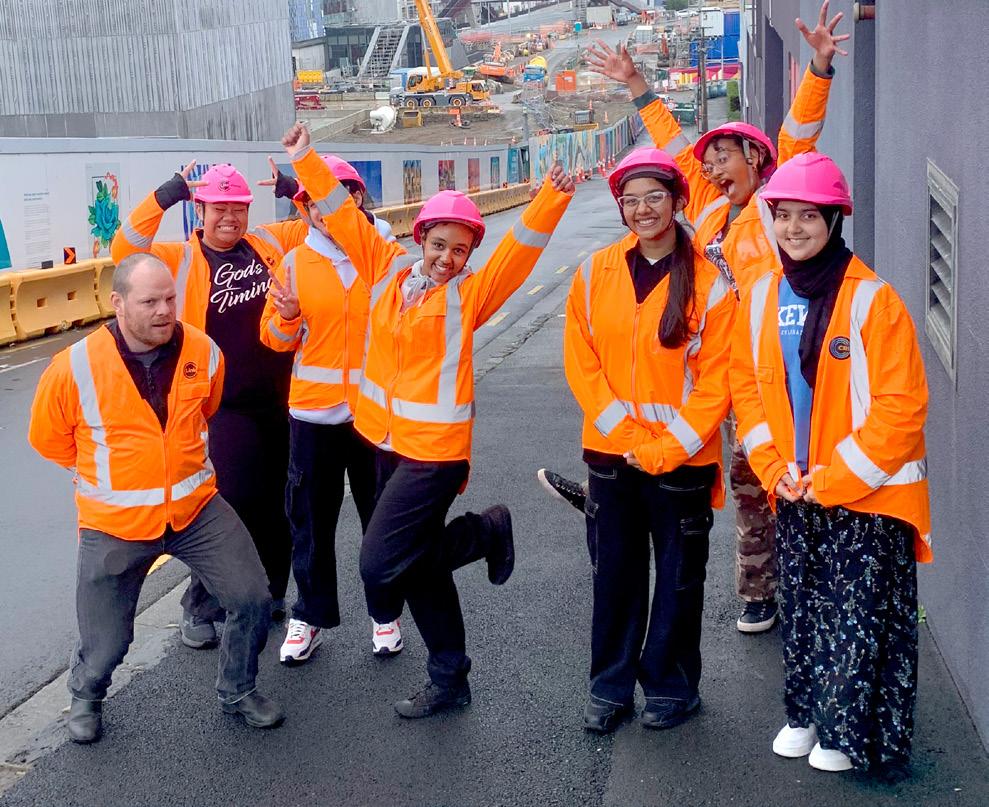


Avelina started back in 2020 as a summer intern and has been with us since. At Te Waihorotiu Station she’s helped build temporary structures underground to enable construction, supported excavation, helped build the main roof slab tunnel and entrance structures. Most recently, Avelina has been working on the urban realm around Te Waihorotiu Station’s Victoria Street entrance.
Avelina says she loves being an engineer, helping to build things and build up her community, adding that it’s a cornerstone of her Tongan culture to do things together and help others when you can. She really values her strong connections to her site team and her community.

Avelina tells us that she believes having more women and Pacific Island people in leadership roles will continue to bring in wider perspectives on how things can be achieved.
“I want to see more representation of diversity in the construction industry, especially in leadership roles. Part of this is having us Pacific Islanders step outside our comfort zone and start going for those roles. I think we can be humble in how we do things, and sometimes we think we’re not good enough. I want to see us keep being comfortable with being uncomfortable. I will keep doing my best, teaching others and giving them what I know.”
We estimate we’ve engaged around 1,500 rangatahi doing expos and visiting their schools 1.5k
We love spreading the word about our project and opportunities in STEAM pathways
We know that schools can’t always visit us onsite, so over the past five years we have tried to attend as many events and expos as possible, reaching thousands of rangatahi.
Our team are our greatest resource and so many of them have taken time out of their workdays to go along to chat to rangatahi about the project and share insights into their careers.
Kudos Science Spinners STEMHUB with Puatala 2022 & 2023
Held in Manukau with many other STEAM organisations, and attended by around 200 students each, we gave students a chance to become young scientists. They tested the quality of water samples collected from our onsite water treatment plant using a turbidity meter, pH meter and a clarity/secchi tube.
‘Girls in Trades’ careers expo – Auckland Girls’ Grammar 2021
Some of the Karanga-a-Hape Station site’s engineering and engagement team members went along to AGGs to share their experiences with a group of young wāhine.
Youth Employer Pledge Event with Tātaki Auckland Unlimited
Four Link Alliance rangatahi shared their career experiences and described the initiatives that have supported and kept them engaged while being employed on the project. Their valuable voices provided insights and lessons for students and employers.
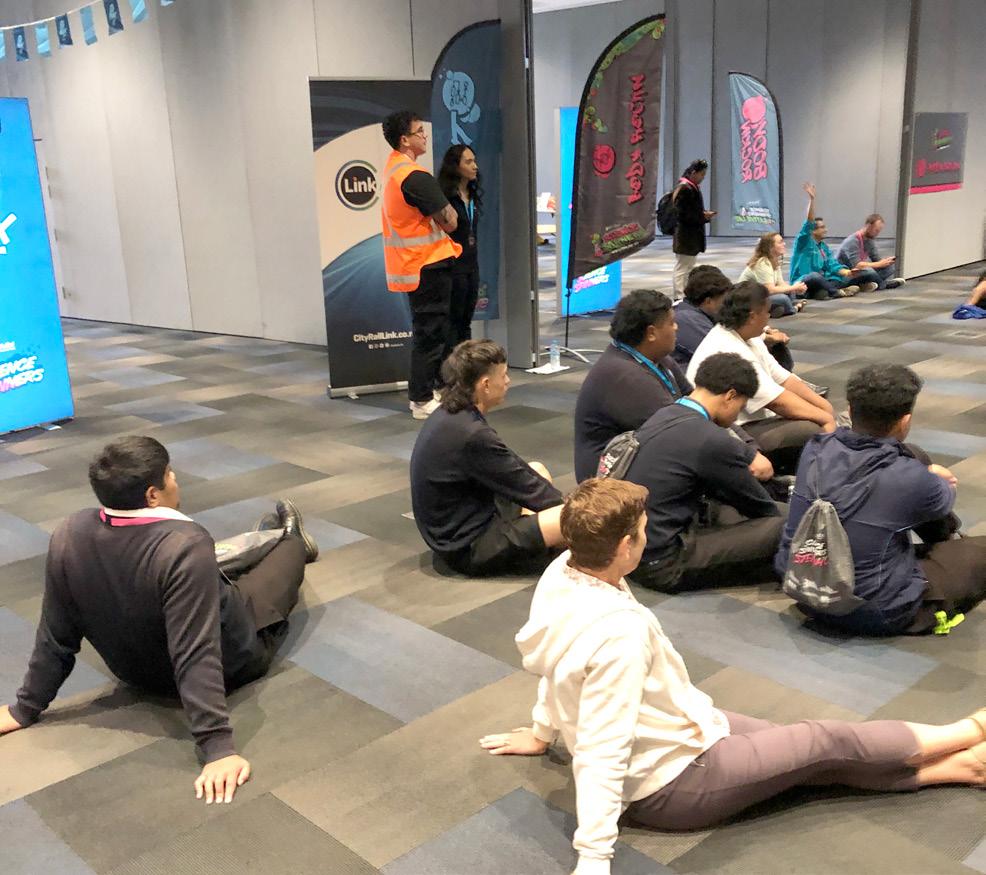


Two ‘Rubbish Day Out’ events have been held (in 2022 and 2024), where we were joined by students and teachers, along with KiwiRail, to pick up rubbish along a section of the Western Line during a Block of Line (when trains aren’t running).
The first clean up in 2022 was with St Peter’s College, and the second included Epsom Girls’ Grammar School as well.

Over the two clean-up days, we picked up and sorted, more than 400kg of mostly recyclable rubbish.
Looking after our local taiao (environment) is important to the project and we loved working with our next generation of sustainability leaders, to keep the neighbourhood beautiful.
Check out this fun video we made with students during 2024’s Rubbish Day Out
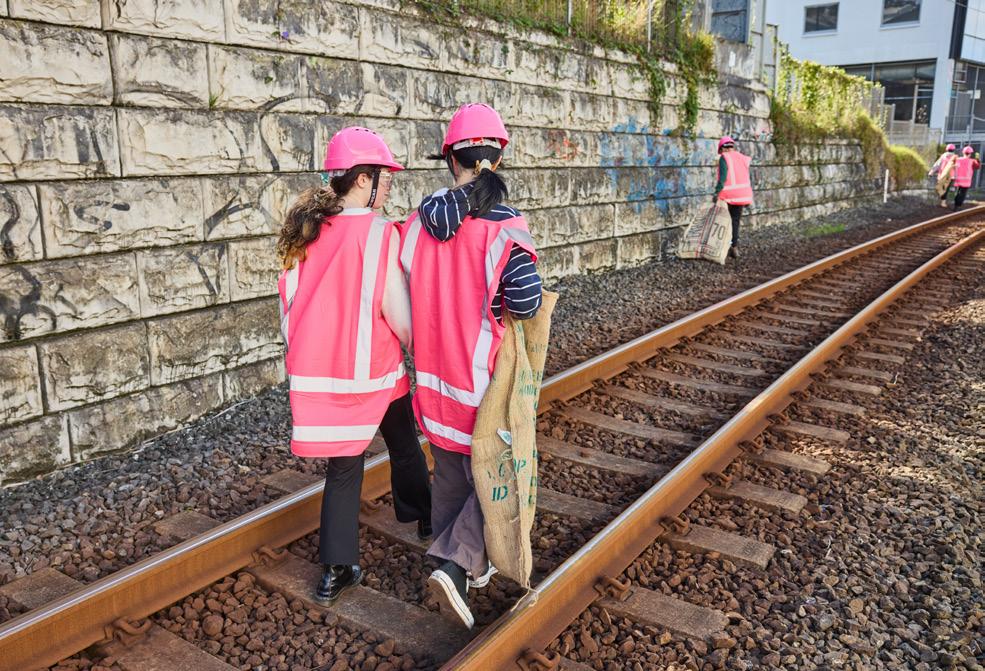
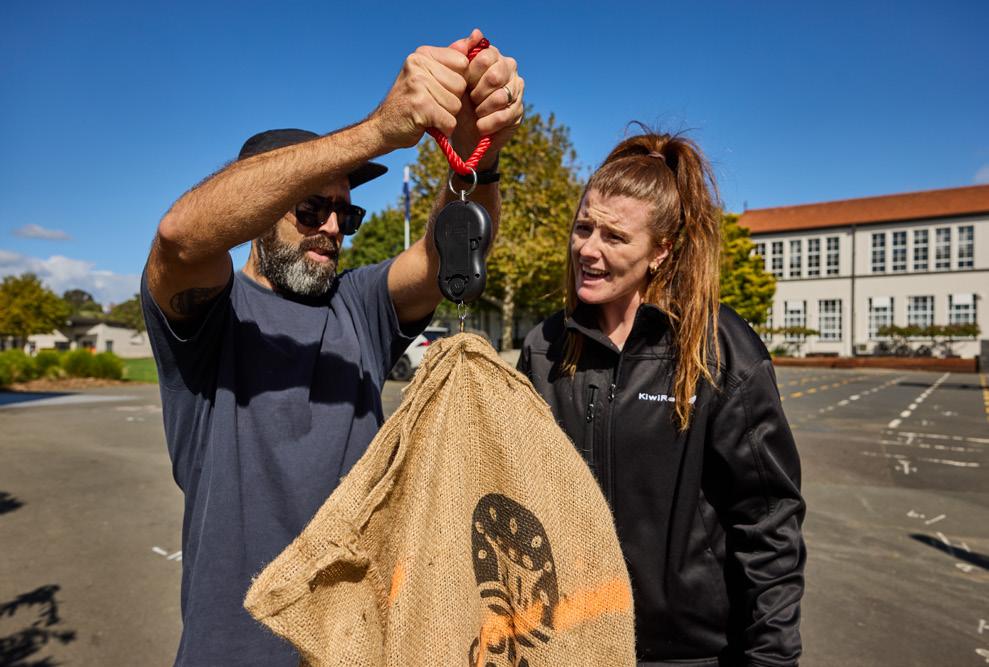

Being able to reach students online was an important part of our rangatahi outreach. This was especially true during Covid-19 restrictions.
In 2021 we turned the project into a virtual classroom for students from all over New Zealand, allowing them to access videos to see how the project is being built while also highlighting careers available in the infrastructure industry.
This was a collaboration between the Link Alliance, the Ministry of Education and online education group LEARNZ, part of CORE Education, which also coincided with the start of the country’s Techweek.
We also leaned on the imagination of students, running a competition for them to design their own public transport station of the future.
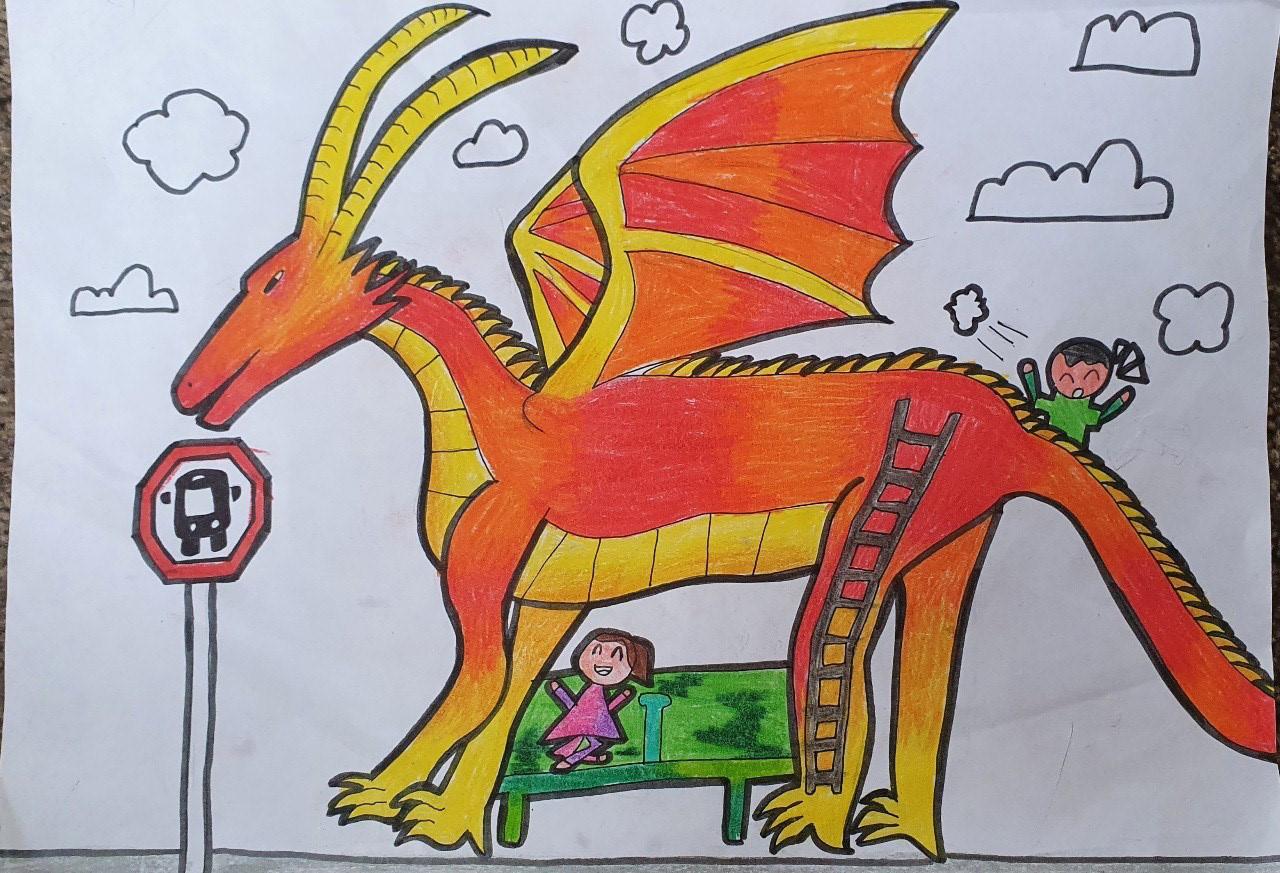
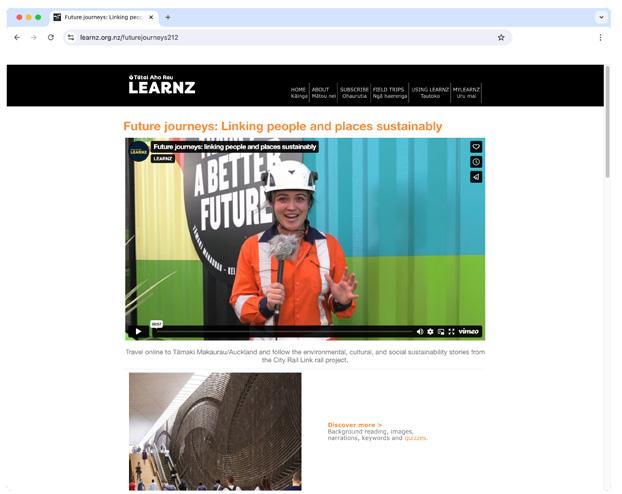
Together with LEARNZ, we showcased some of the places, people, ideas and initiatives through a virtual field trip.

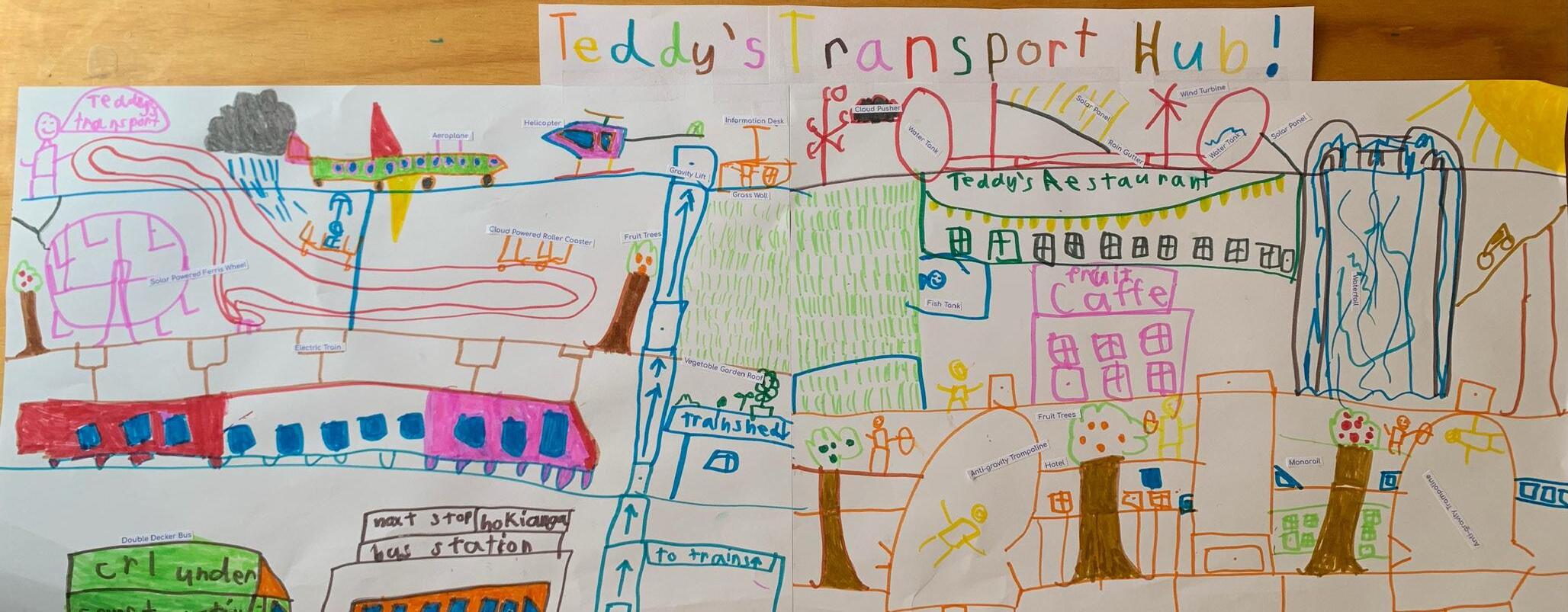
Stories that inspire, is a video resource that has been shared with schools, communities and industry
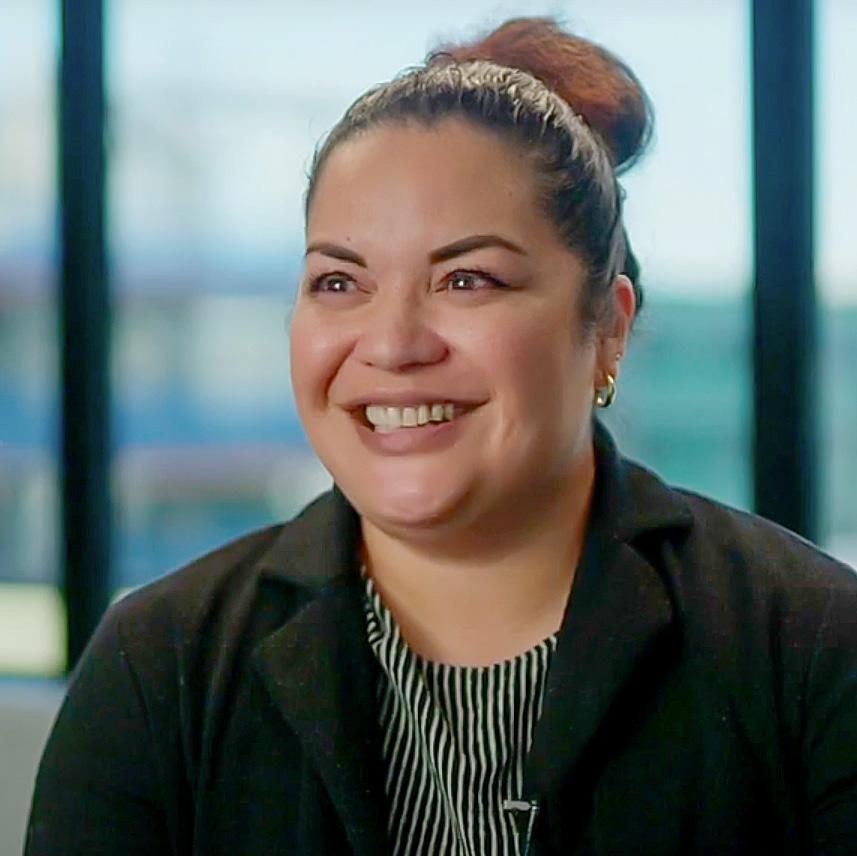
Veronica Maka-Lui is an Owner Verifier – Rail Systems with the CRL project. Sharing stories like Veronica’s has helped us showcase pathways into engineering in the office and out on site that many young women might not see otherwise.
“My Pasifika background plays a big role in how I present myself as an engineer – we’re not about journeying alone. We’re about community and ultimately engineering is all about problem-solving as a group. When I was in high school I never saw anyone that looked like me in the role of an engineer. So to be a role model to young people who are interested in this industry, to be Pasifika and female in the industry, it is an absolute honour. I want those who can relate to my journey to know that if I can do it, they can too.”
Veronica Maka-Lui, Owner Verifier – Rail Systems
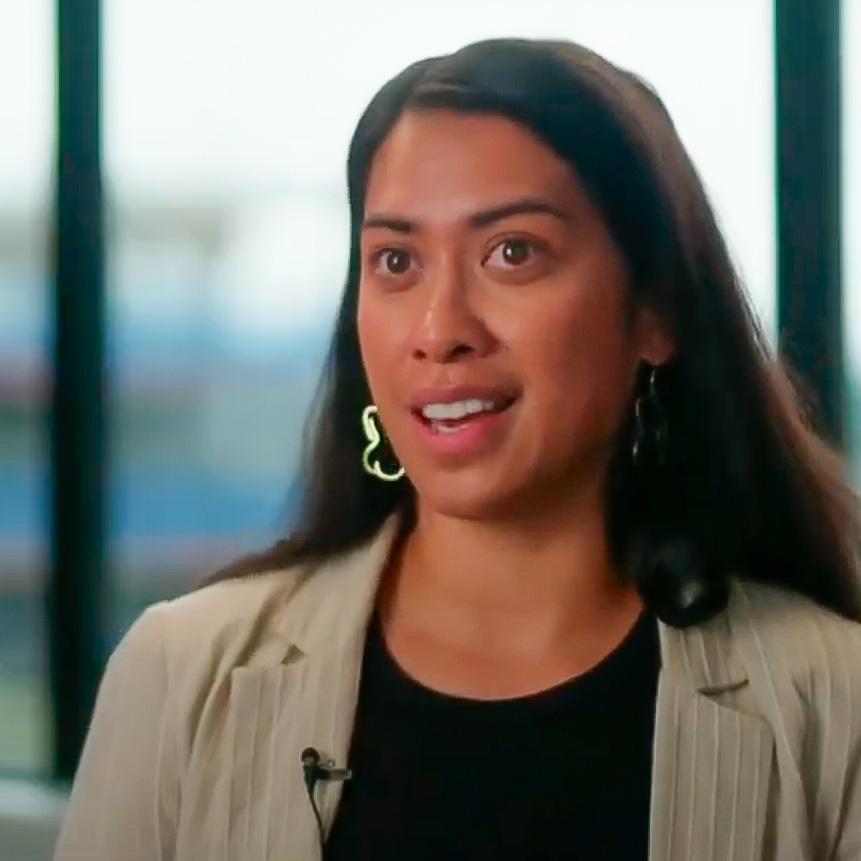
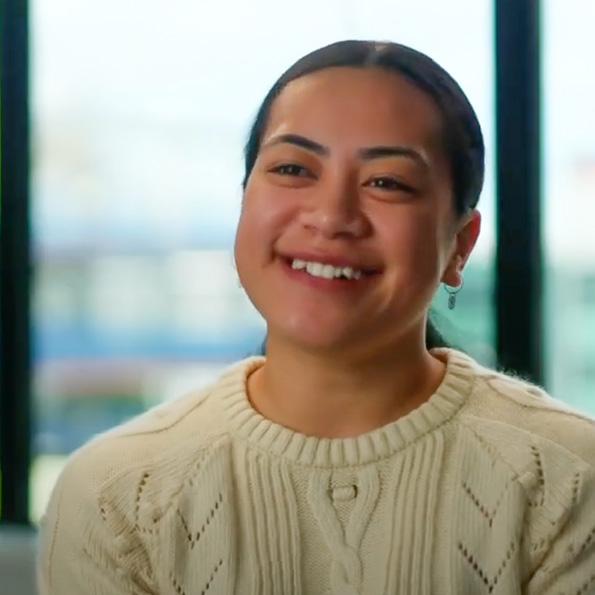
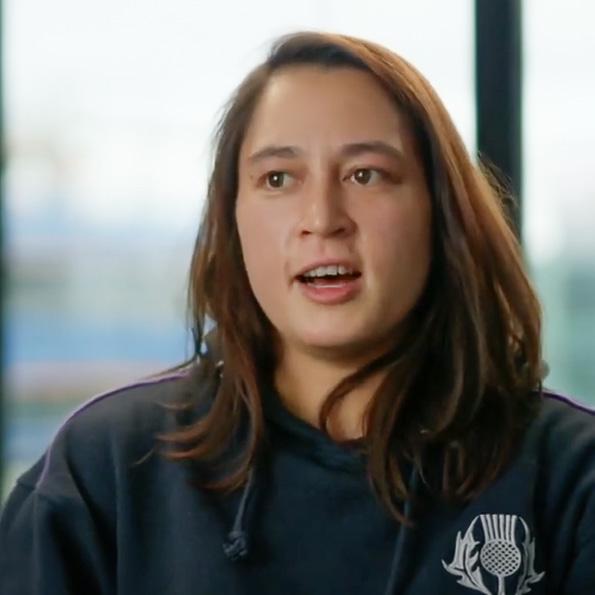
“The whole idea of our involvement is to educate students about the CRL and the transformational transport benefits it will bring to Auckland, and to give them a glimpse of the diverse opportunities an infrastructure project of this size provides,”
FRANCOIS DUDOUIT, LINK ALLIANCE PROJECT DIRECTOR
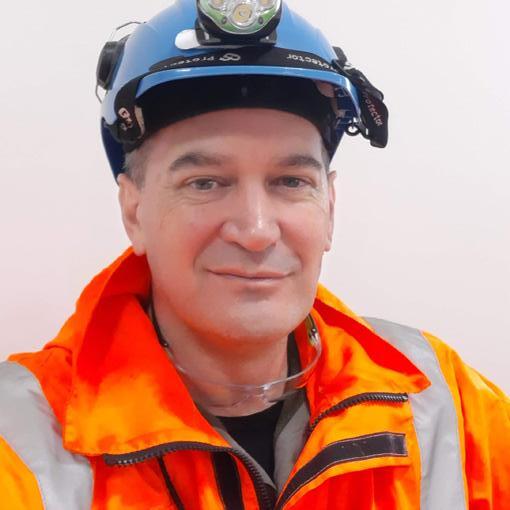
Raised in the small rural community of Taumarunui, I know how important education is to forging a rewarding career. I’ve worked in civil engineering for over 24 years on major infrastructure projects across New Zealand, Australia and the Pacific and I enjoy opportunities to tell my story to the younger generation.
GLENN HOUPAPA - STATIONS DELIVERY MANAGER
Being able to support rangatahi to understand the components of a payslip; demystifying the complex language in employment agreements; grow each individual’s confidence to manage their money; set SMART goals and be supported on their own Māori development journey has been a special, humble, fun and exciting project to be part of from its inception to completion. This is the true journey of project partnership.
TINA ROSE - EDUCATION UNLIMITED DIRECTOR
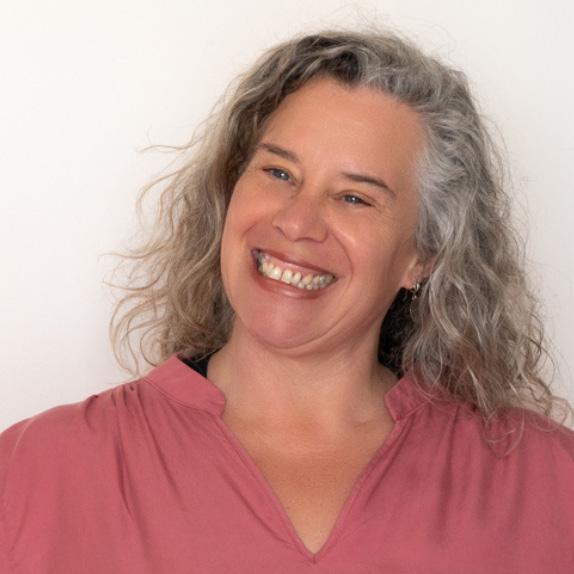
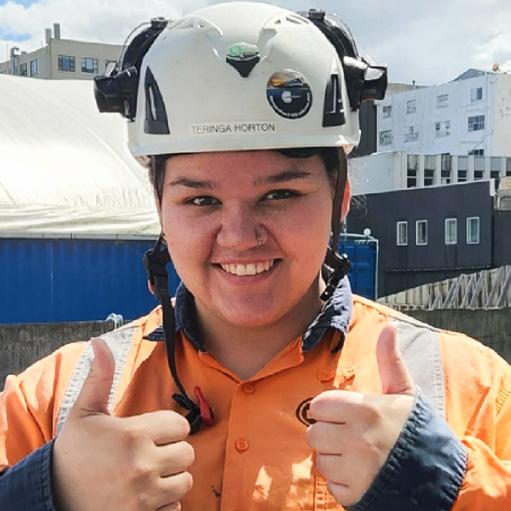
I like to take part in the engagement sessions as I love to show what I do to the youth in hopes to inspire them and show them that there’s more than just pick packing and labouring jobs out there.
TERINGA HORTON - MINED TUNNELS – GRADUATE ENGINEER, MAUNGAWHAU STATION
I love engaging with and sharing my knowledge with the next generation. They will be our future change makers of the world!
DIANA TOKI-HU, SENIOR COMMUNICATIONS & ENGAGEMENT ADVISOR, TE WAIHOROTIU STATION
We love visiting the Link Alliance and the students really enjoyed their time. Some of the students were on their second visit and were amazed at the difference in the worksite. They chatted all the way back to school and seem to have a good sense of what they saw.
LOUISE – EDUCATOR AT MANGERE COLLEGE

I thoroughly enjoyed the trip last year and it was every bit as good this year. Thank you for the opportunity to build an ongoing relationship with City Rail Link and for your welcoming and engaging staff and activities. We felt moved by the time and thought you had put in to making the visit memorable for the boys.
MARGARET – EDUCATOR AT CENTRAL AUCKLAND SPECIALIST SCHOOL
Kia ora, I first joined the project as a representative of my Iwi Ngāti Te Ata Waiohua as part of the CRL’s Mana Whenua Forum.
My passion for wanting people to succeed was recognized by CRL and I was invited to apply for the CRL Social Development Advisor role. Upon securing the position I wrote the CRL Social Outcomes Strategy from an aspirational point of view thinking that some of my suggestions would get knocked back. I was pleasantly surprised when I was given the green light to focus on connecting rangatahi with meaningful employment and training, engage with students at school, in training and at tertiary institutes to support our future workforce and include social procurement opportunities for Māori and Pasifika businesses.
in their fields and were dedicated to making positive change for the community.

I created a bespoke Progressive Employment Programme (PEP), which helped rangatahi (youth) breakthrough employment barriers to meaningful employment. The PEP has won several awards nationally and internationally, with the real winners being the rangatahi and their families.
I would like to thank every person that has been involved with the Link Alliance Social Outcomes programmes. The rangatahi and their families, training providers, onsite teams, office teams, management, the big bosses and the funders. My final thank you is to the Social Outcomes Team, thank you for your passion, commitment, vision and aroha (love).
In 2019 I was seconded to the Link Alliance as the Social Outcomes Legacy Manager (SOLM) and wrote the Link Alliance Social Outcomes Management Plan. I then had the privilege of recruiting a team that had Link Alliance Objective 7 “Social Outcomes that make a positive difference to the lives of others” as their focus. The Social Outcomes team became leaders and experts
Ehara taku toa i te toa takatahi, he toa takitini kē.
My success is not mine alone, but it is the strength of many.

Without each and every one of you this would not be possible.

cityraillink.co.nz